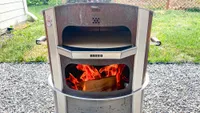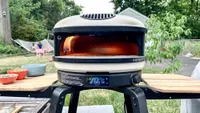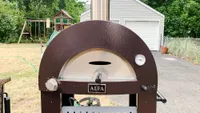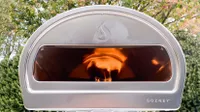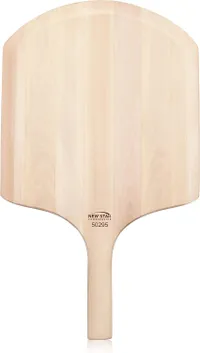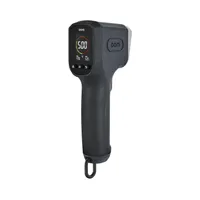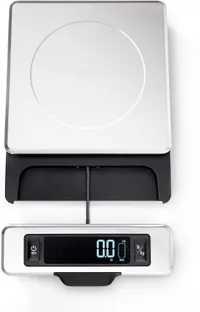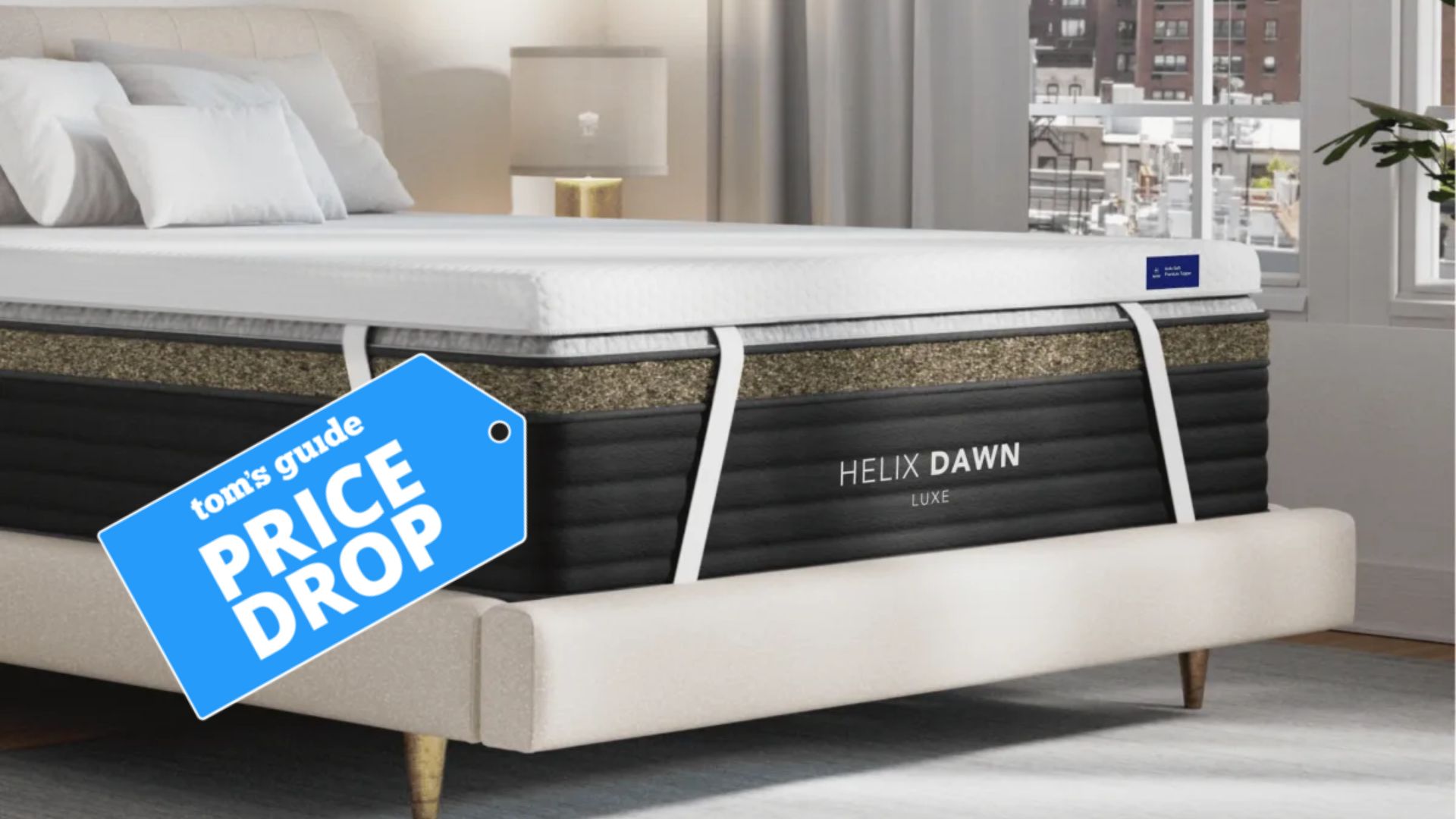Best pizza ovens: Tested and rated
The best pizza ovens for making pies in your backyard
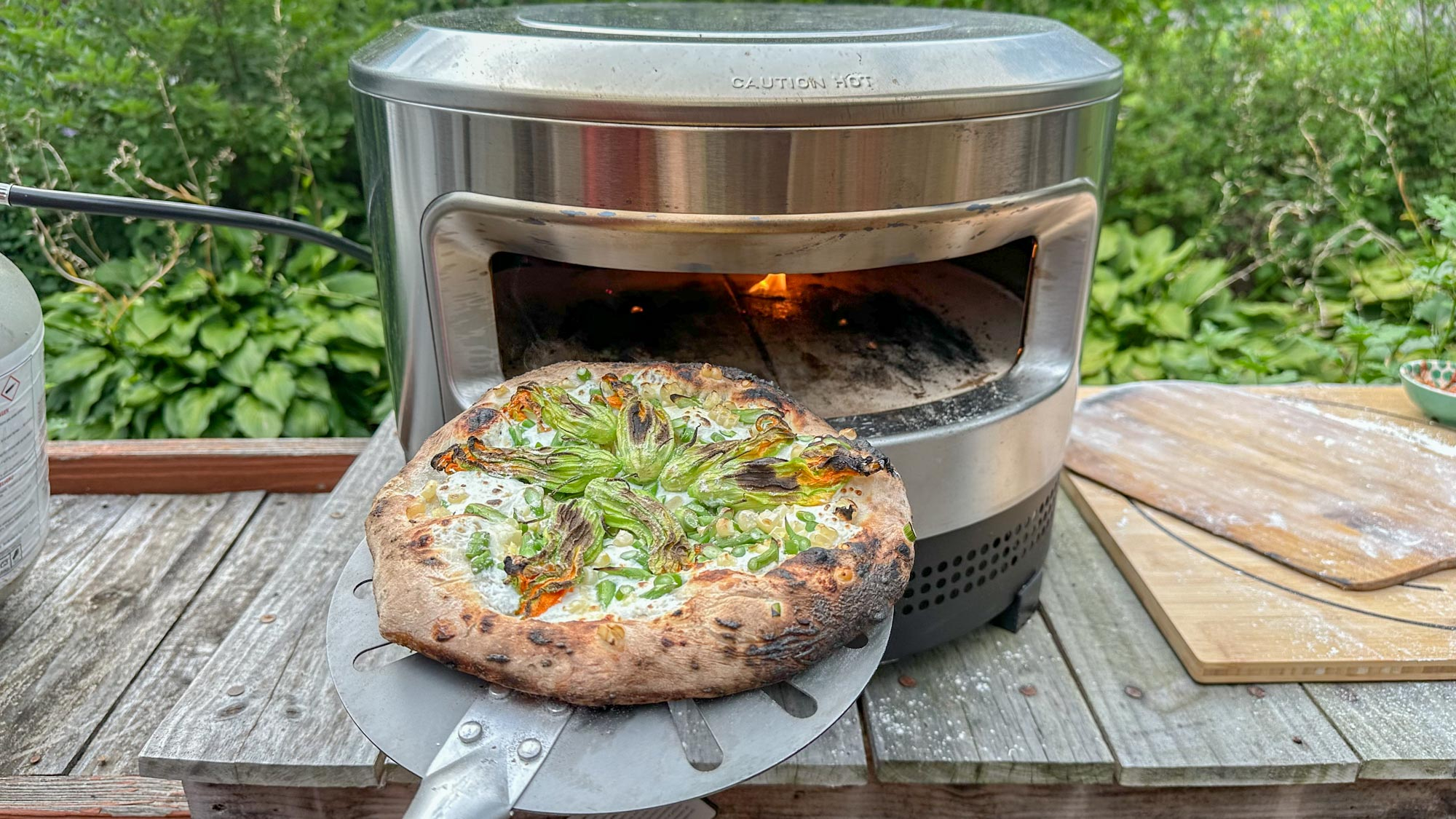
- The quick list
- Best overall
- Best budget
- Best premium oven
- Most portable
- Best multifuel oven
- Best grill attachment
- Best fire pit attachment
- Best electric oven
- Best cheap electric oven
- Best for large pies
- Also tested
- Outdoor pizza ovens compared
- How we test the best pizza ovens
- What to look for in a pizza oven
- Pro tips for pizza making
- Other tools you'll need to make pizza
The best outdoor pizza ovens let you make delicious pies in minutes, right from the comfort of your backyard. Just like you'll find in a pizzeria, these ovens can reach temperatures of up to 900 degrees Fahrenheit, so you get crispy crusts with chewy insides, and nice, bubbling cheese and tomato sauce in less time than it takes to order takeout.
After testing more than a dozen ovens over several years — and eating way too much pizza — I think the best model overall is the Ooni Karu 16. This gas-only oven is easy to set up and, thanks to a unique L-shaped burner, can cook pizzas more evenly and with less fuss, which is handy for those less experienced. If you're looking for something less expensive, the Solo Stove Pi Prime is the outdoor pizza oven to get, as it works just as well, yet costs less than $350.
We've thoroughly tested each oven, to see how easy they are to set up, how quickly they get up to temperature and stay there, and how well they can cook up different styles of pizzas, bread, calzones, and even steaks and other food. Yeah, it's a tough job, but someone's gotta do it.
Interested in tossing some dough at an outdoor pizza oven? Let’s slice and dice through the best models that we've tested.
The quick list
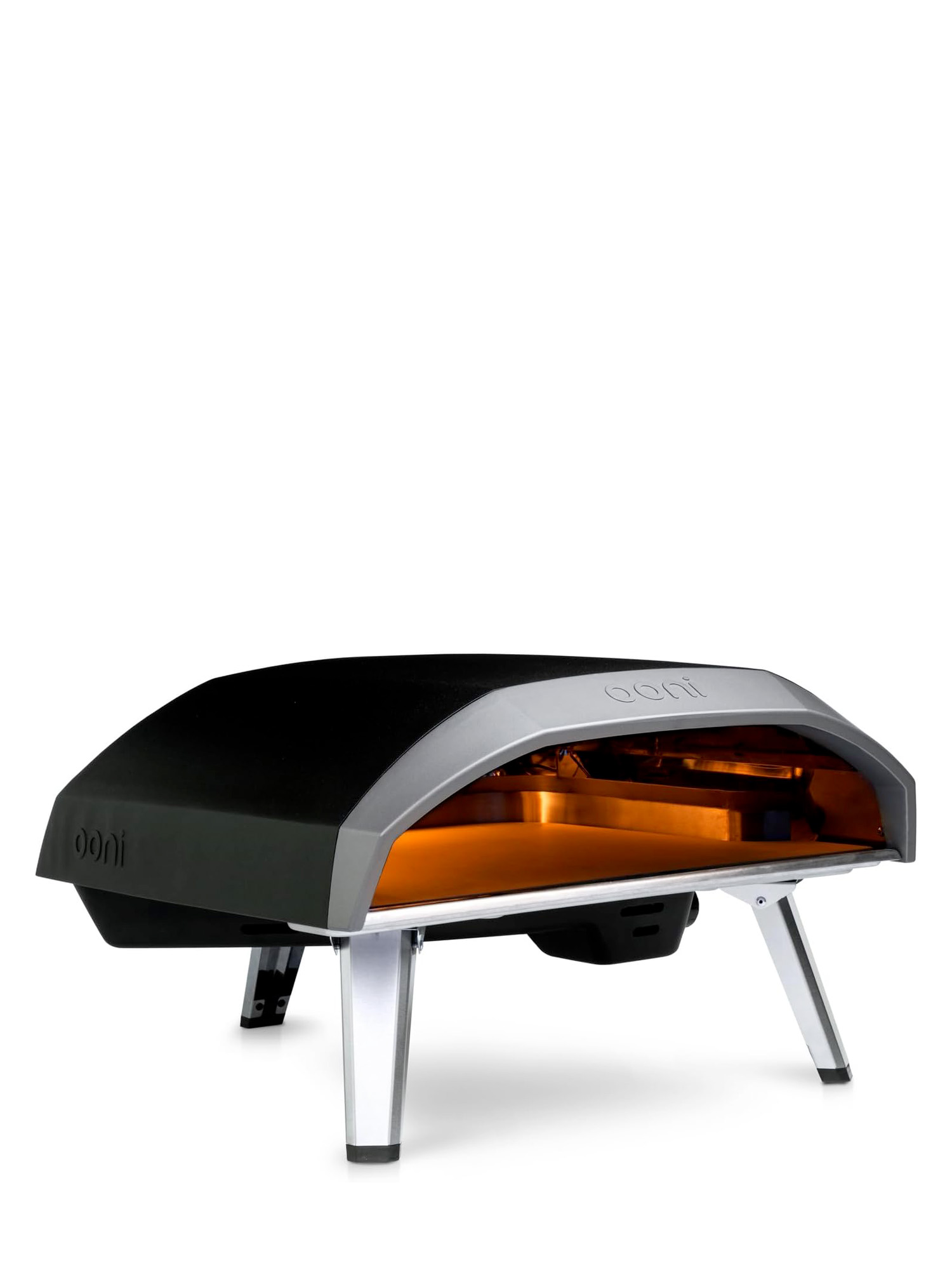
The Koda 16 has a clever L-shaped burner, so we found we didn't have to turn our pies as often in the oven. It's a small, but neat feature not found elsewhere.
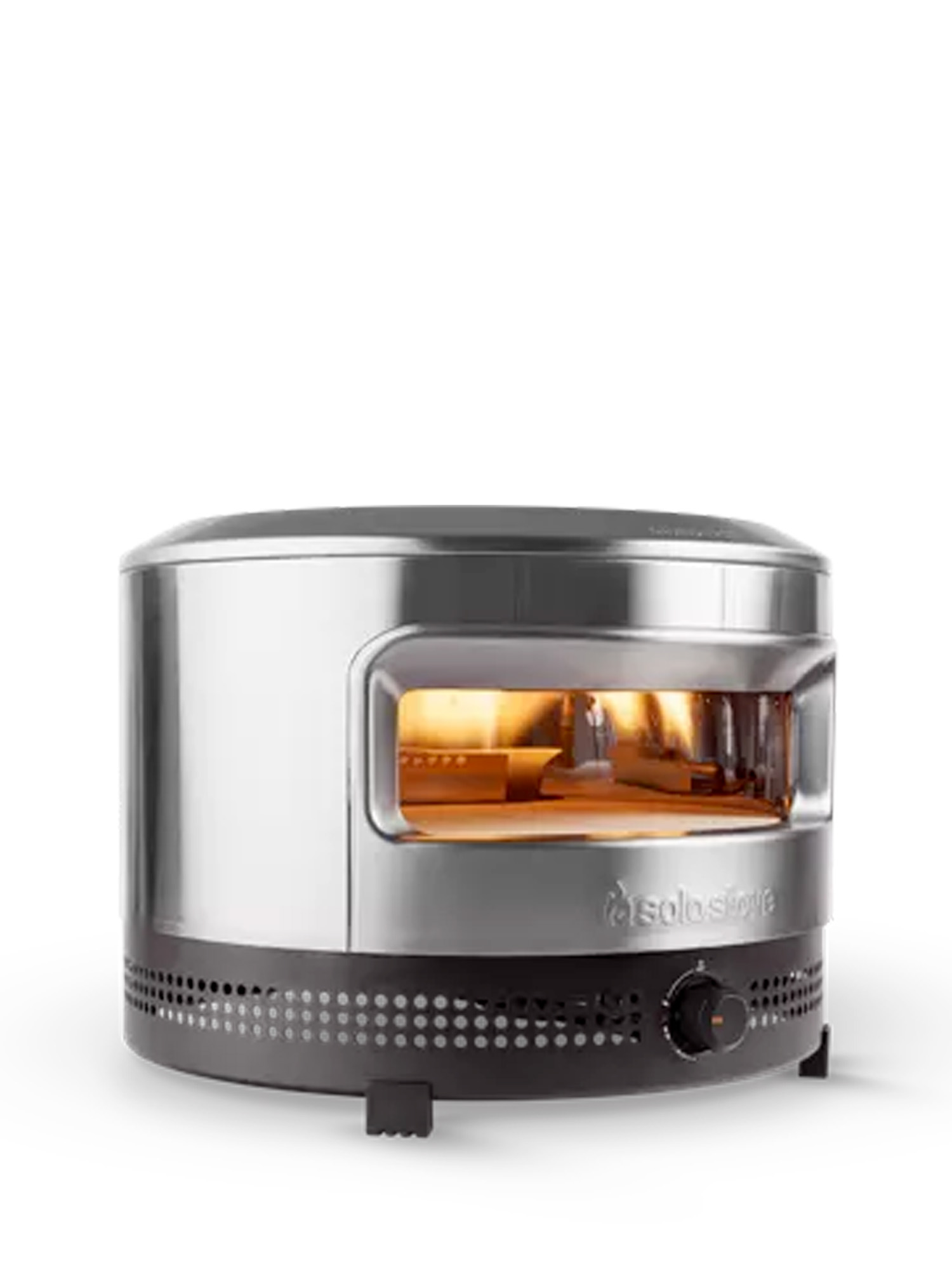
This propane-powered model is very easy to set up and use, and it's fairly inexpensive, yet it can make great pizzas in less than two minutes.
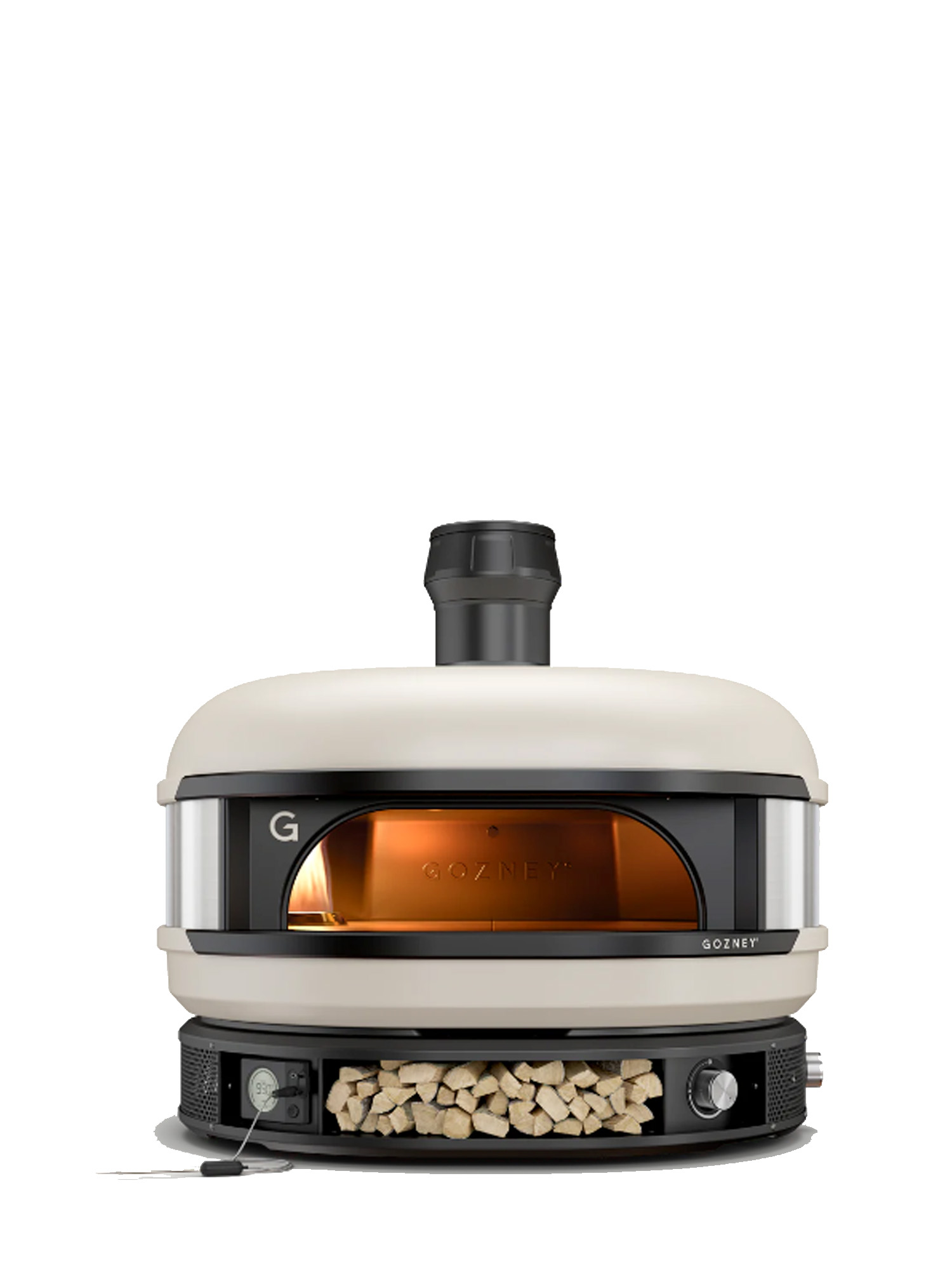
The Gozney Dome can run on wood or gas, has a huge cooking surface, and looks awesome. But, it's one of the more expensive ovens we tested.
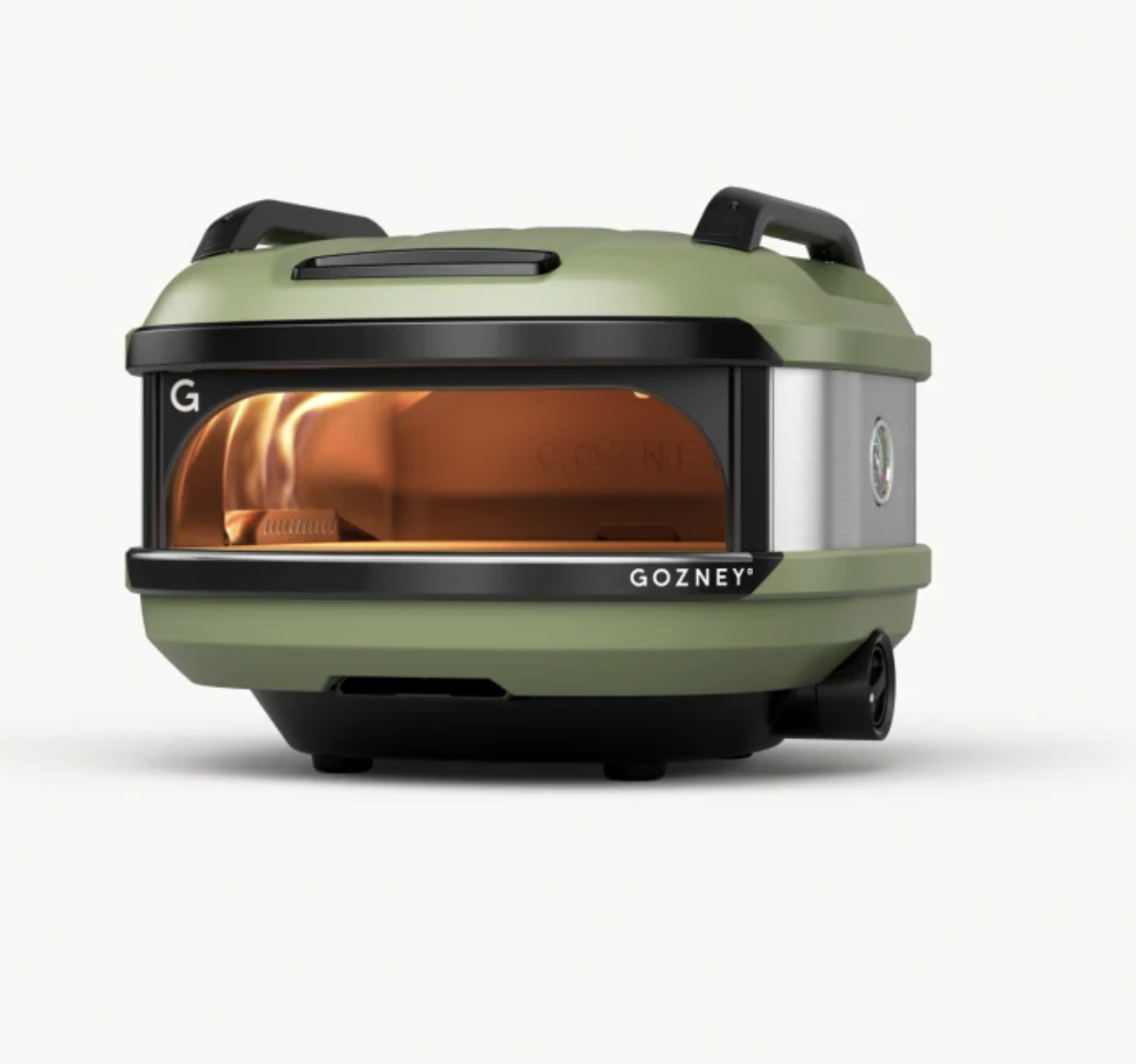
At less than 30 pounds, this is the best portable oven we've tested. This gas-powered oven is on the pricey side, though.
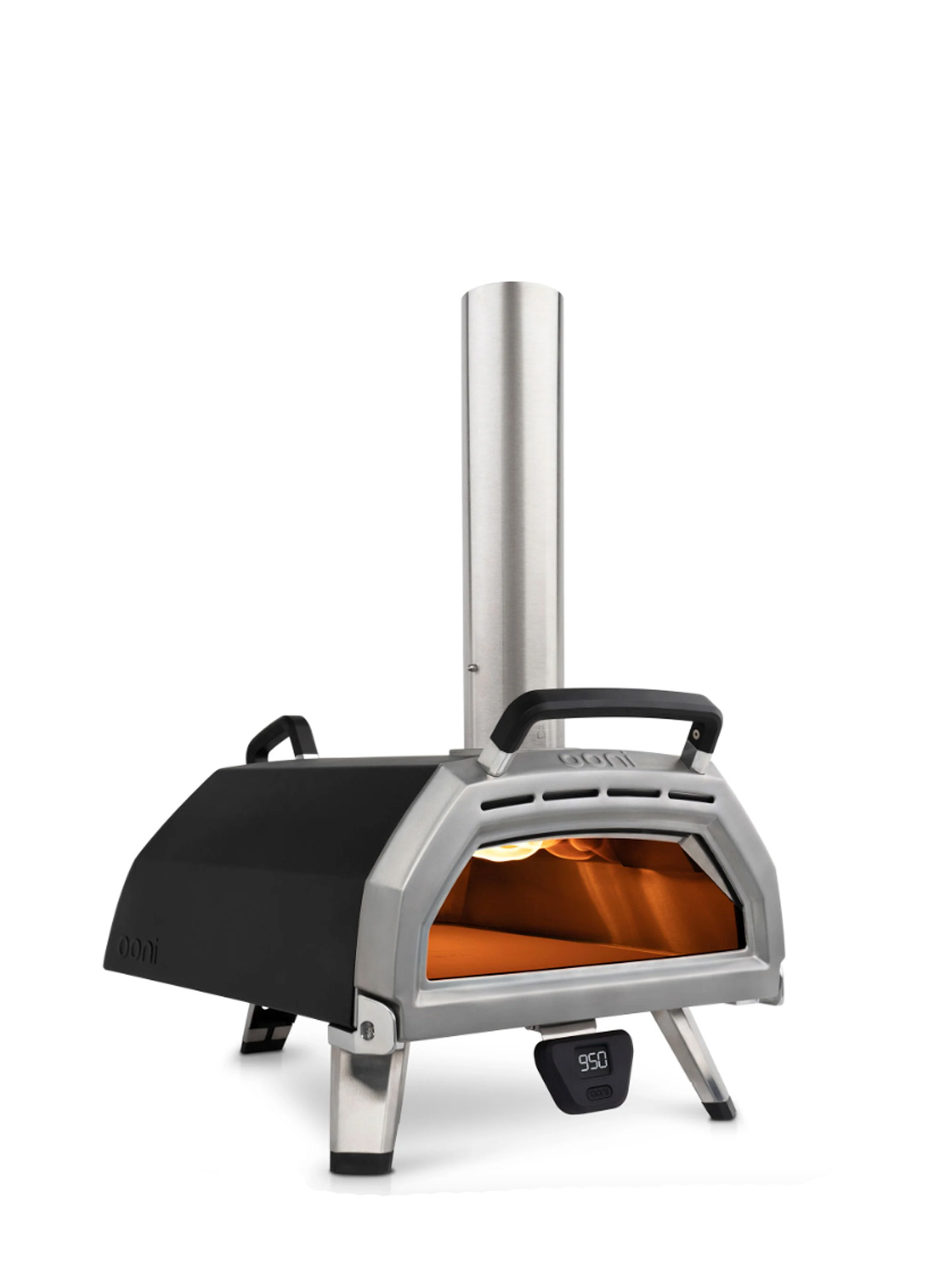
A large 16-inch cooking surface, the ability to use wood, gas, or charcoal, a huge glass door, and a built-in thermometer make the our top pick.
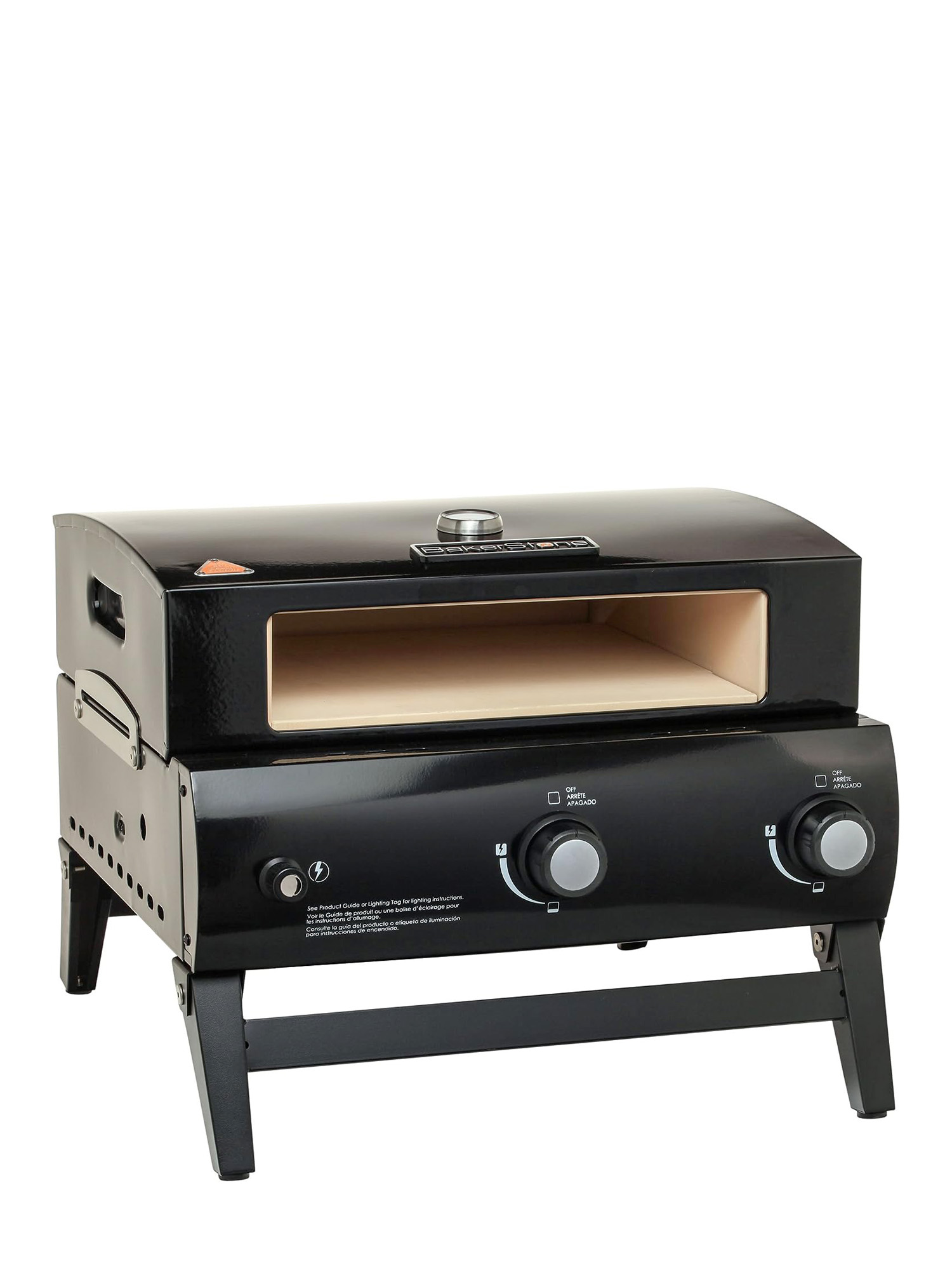
The neat thing about this oven is that the top half can be placed on your grill, giving you more options on how you want to make pizzas.
View more products...
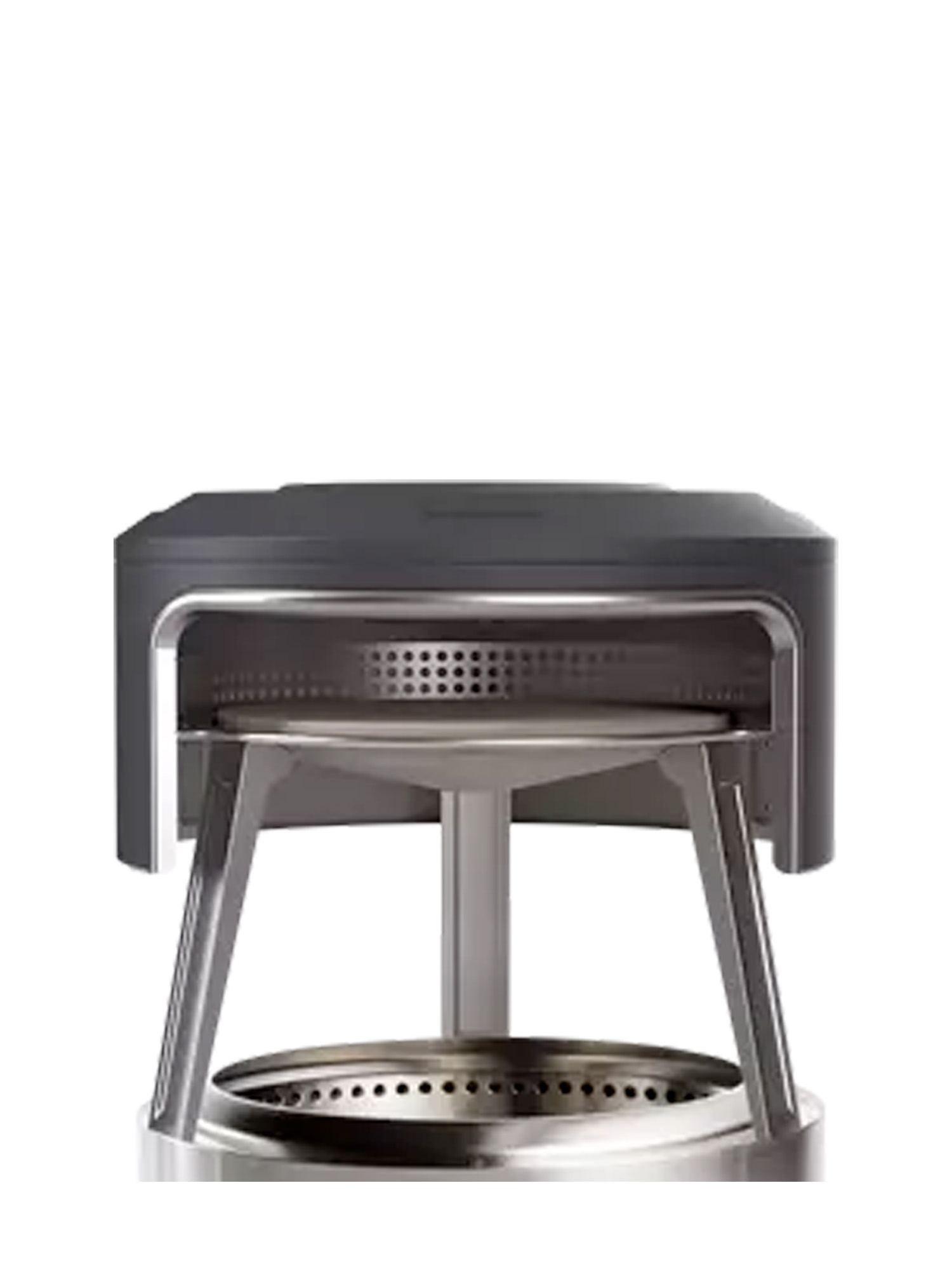
If you have a Solo Stove, you might want to give this pizza oven a try; it fits right on top of the fire pit. However, it takes a lot longer to cook pizzas than other ovens.
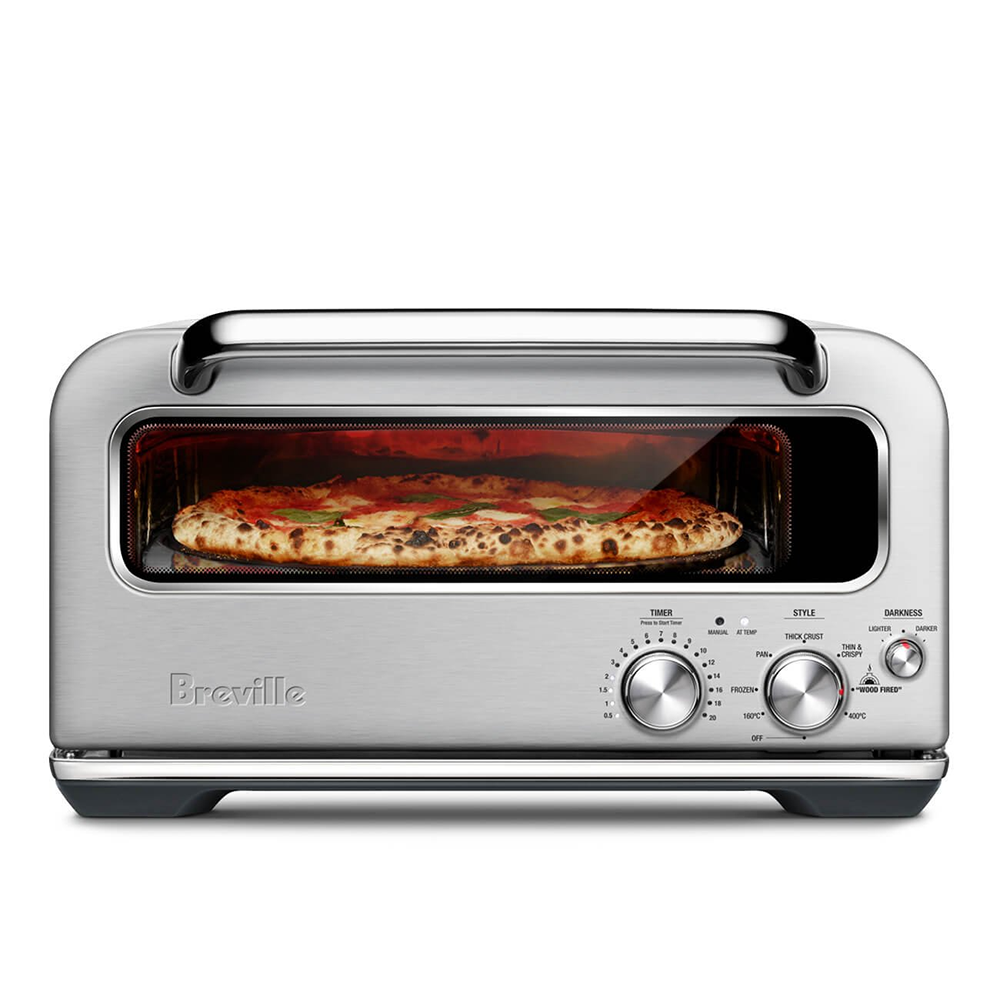
It can only be used indoors, but Breville's electric oven makes pizzas as good as any of those we tested outdoors. It's not cheap, though.
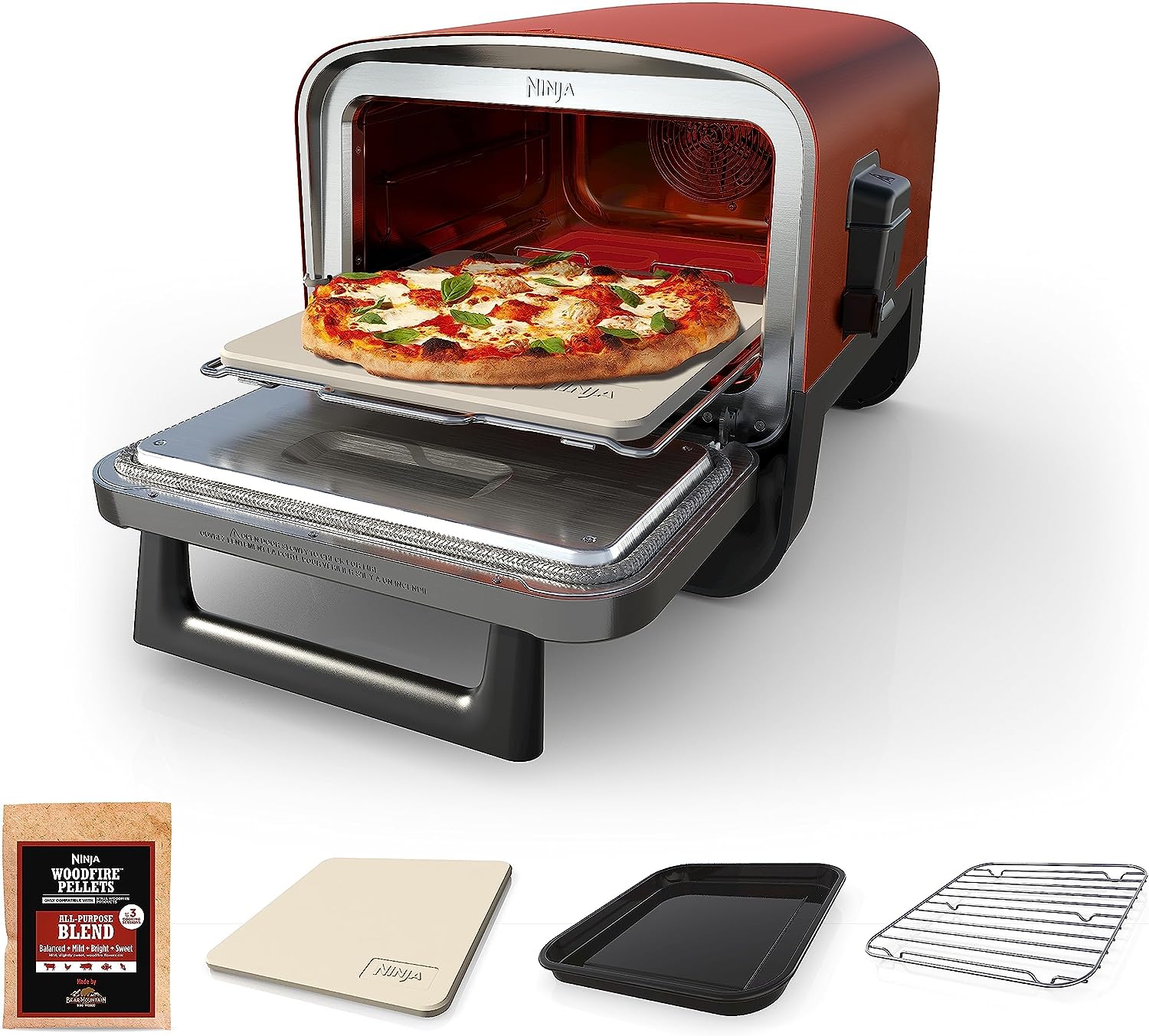
The electric Ninja Woodfire can be used indoors and out, and while it doesn't get as hot as other ovens, it works great for the price.
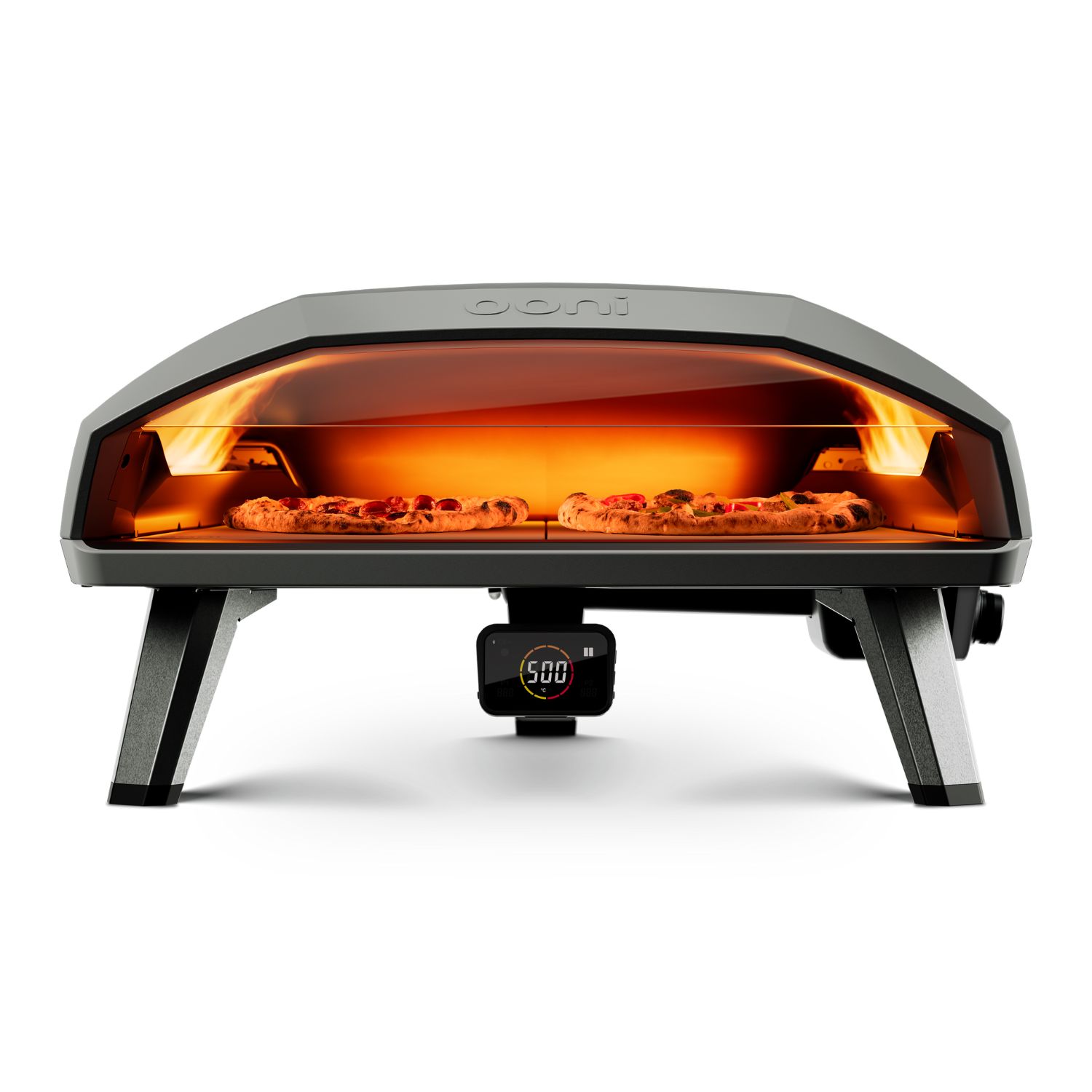
If you want to make pies the size you get from your local pizza joint (up to 24 inches!), this is the oven for you — but it's the most expensive in Ooni's lineup.
The best outdoor pizza oven
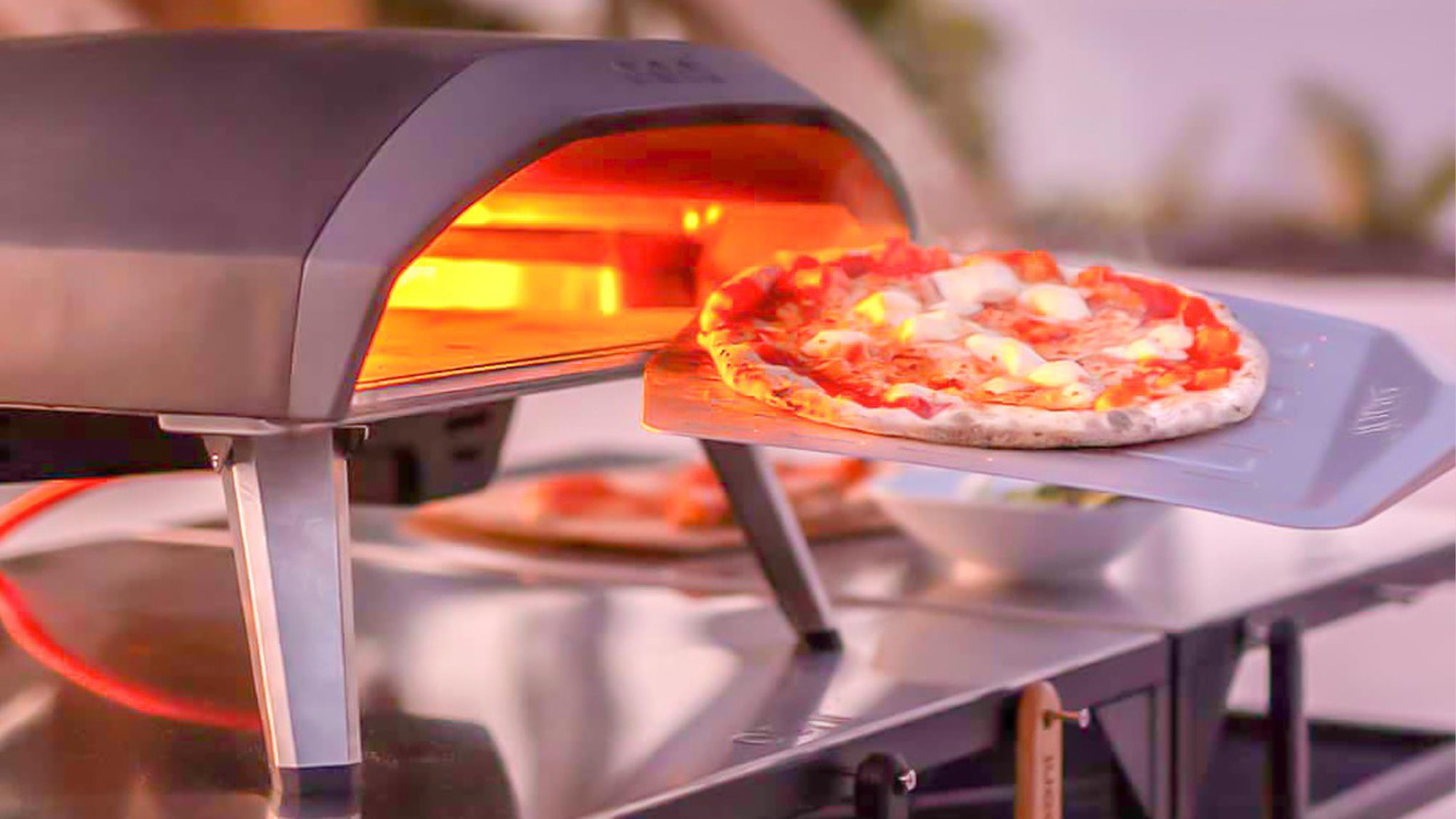
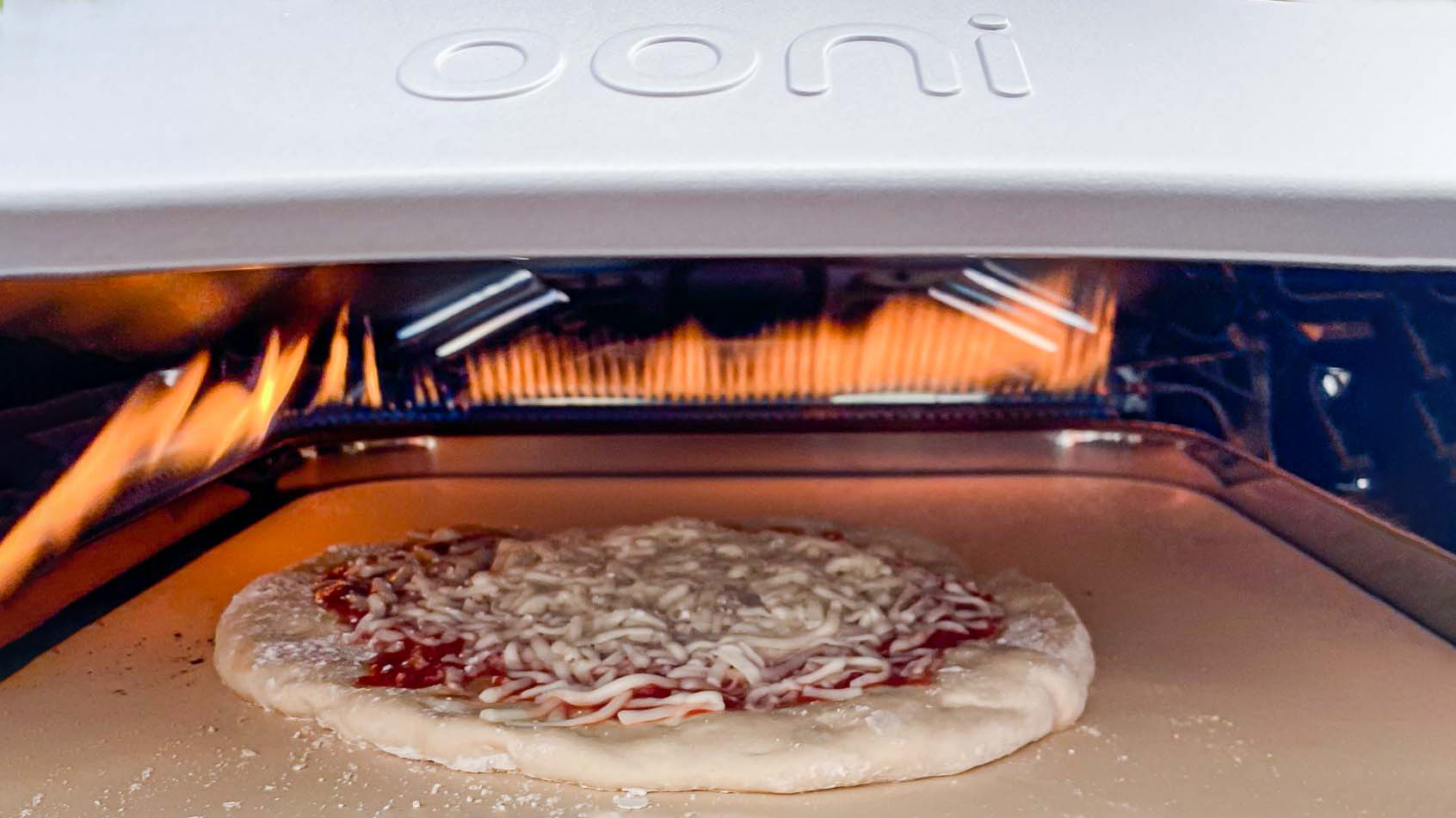
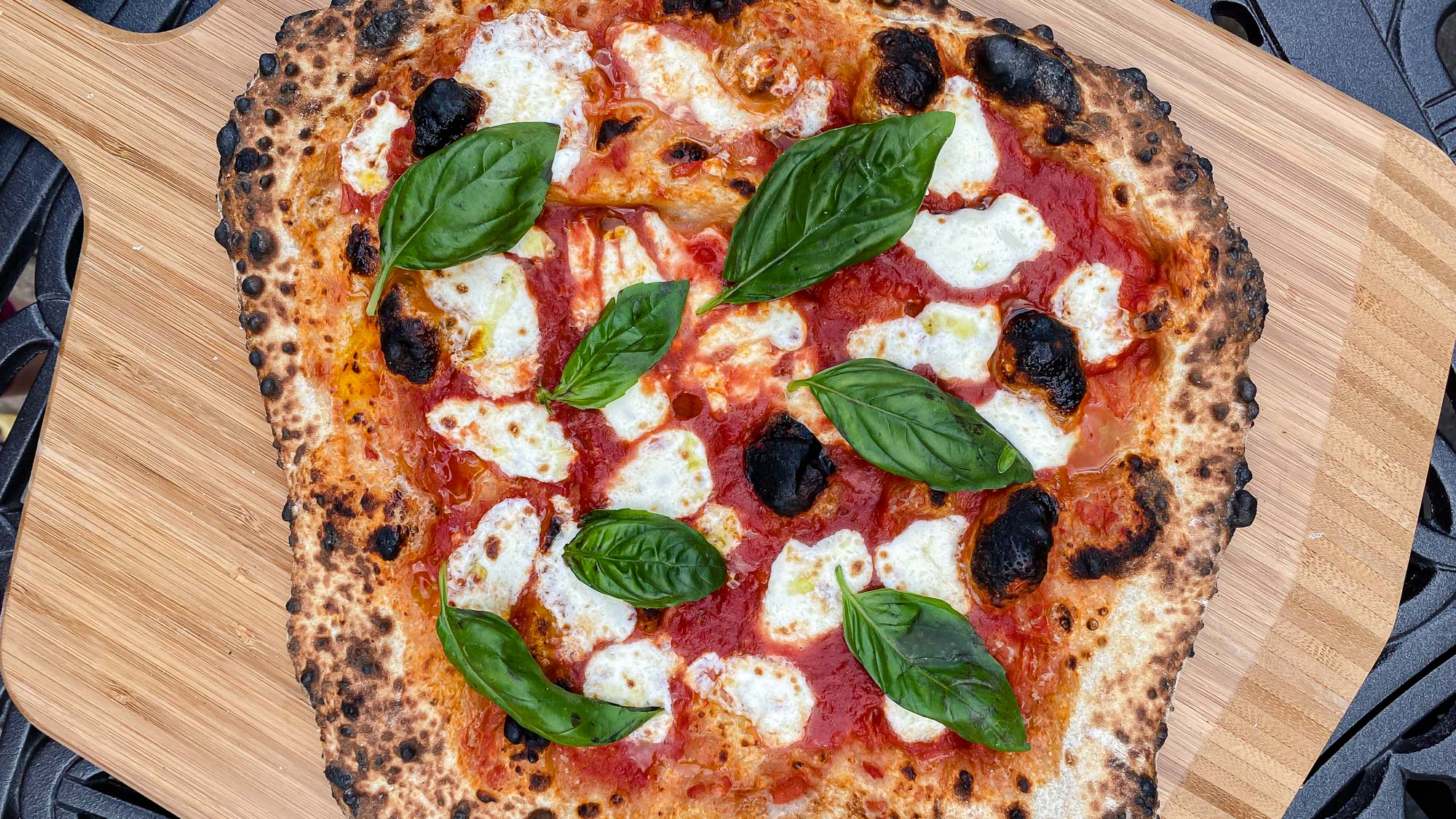
Specifications
Reasons to buy
Reasons to avoid
Of all the outdoor pizza ovens we tested, we think the Ooni Koda 16 is the best overall. For its ease of setup, relatively lightweight construction, no-fuss functionality, large cooking space, and powerful L-shaped flame, we felt it’s the most versatile, family-friendly model for cooks who might want to experiment with different pie sizes, as well as cooking other non-pizza items in the oven.
Because of the L-shaped heat source, pizzas cooked near the back left corner of the oven took only a couple of minutes to come out perfectly charred and bubbly. And unlike other ovens with a singular flame or radiant heat, you really only need a turn or two of a pie to get an evenly cooked crust. A control knob on the side of the oven made it easy for us to adjust the Koda 16's temperature, so we could go from Neapolitan to New York in no time. About the only thing missing was a built-in thermometer, like you can find on some newer ovens like the Gozney Arc.
The Koda 16 is the larger of Ooni's two propane-powered Koda models — with a 16-inch cooking area vs. the Koda 12’s 12-inch cooking area — so you may want to opt for the smaller one if you have more of a limited budget, or a smaller appetite.
Read our full Ooni Koda 16 review.
Best budget pizza oven
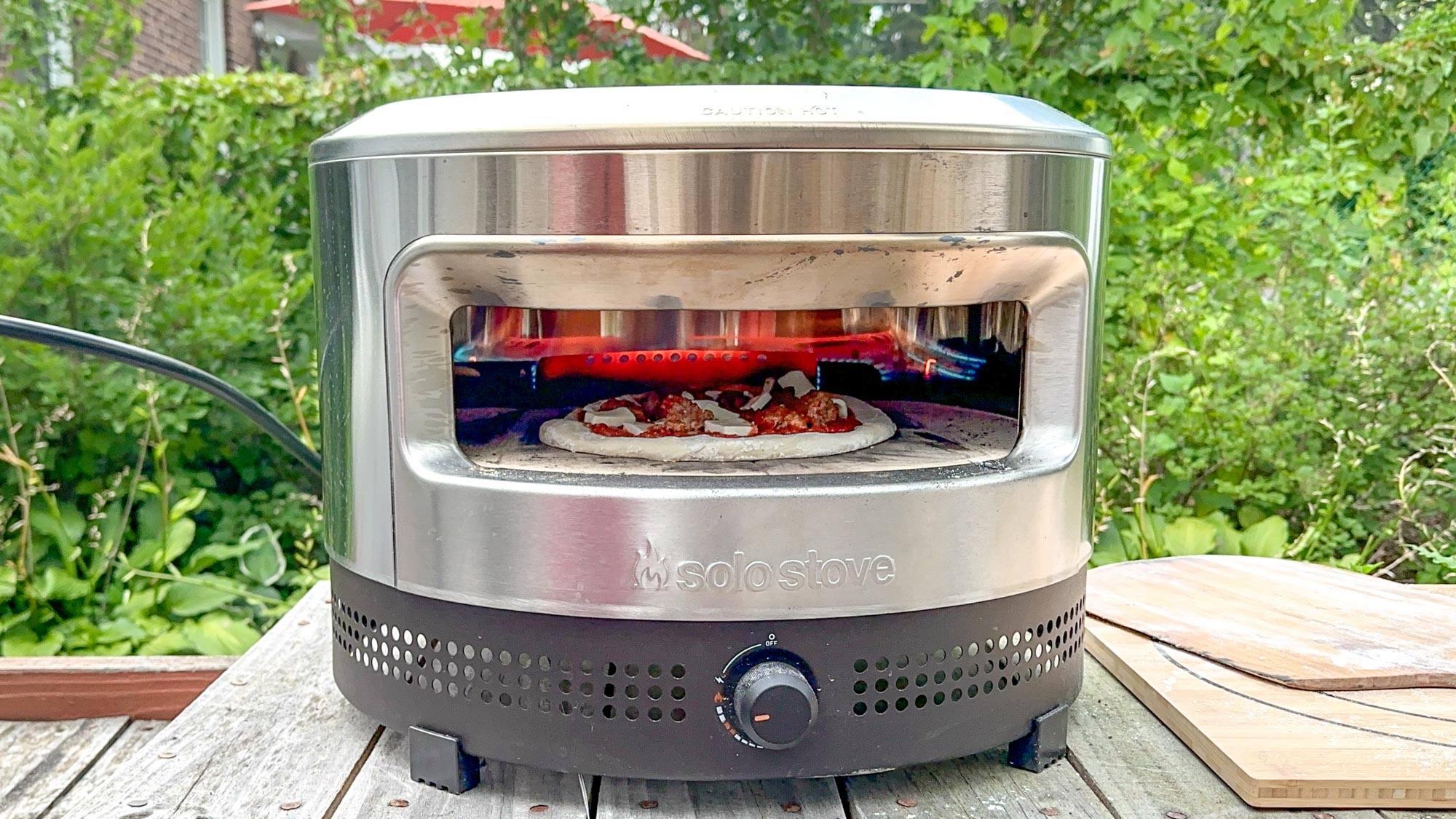
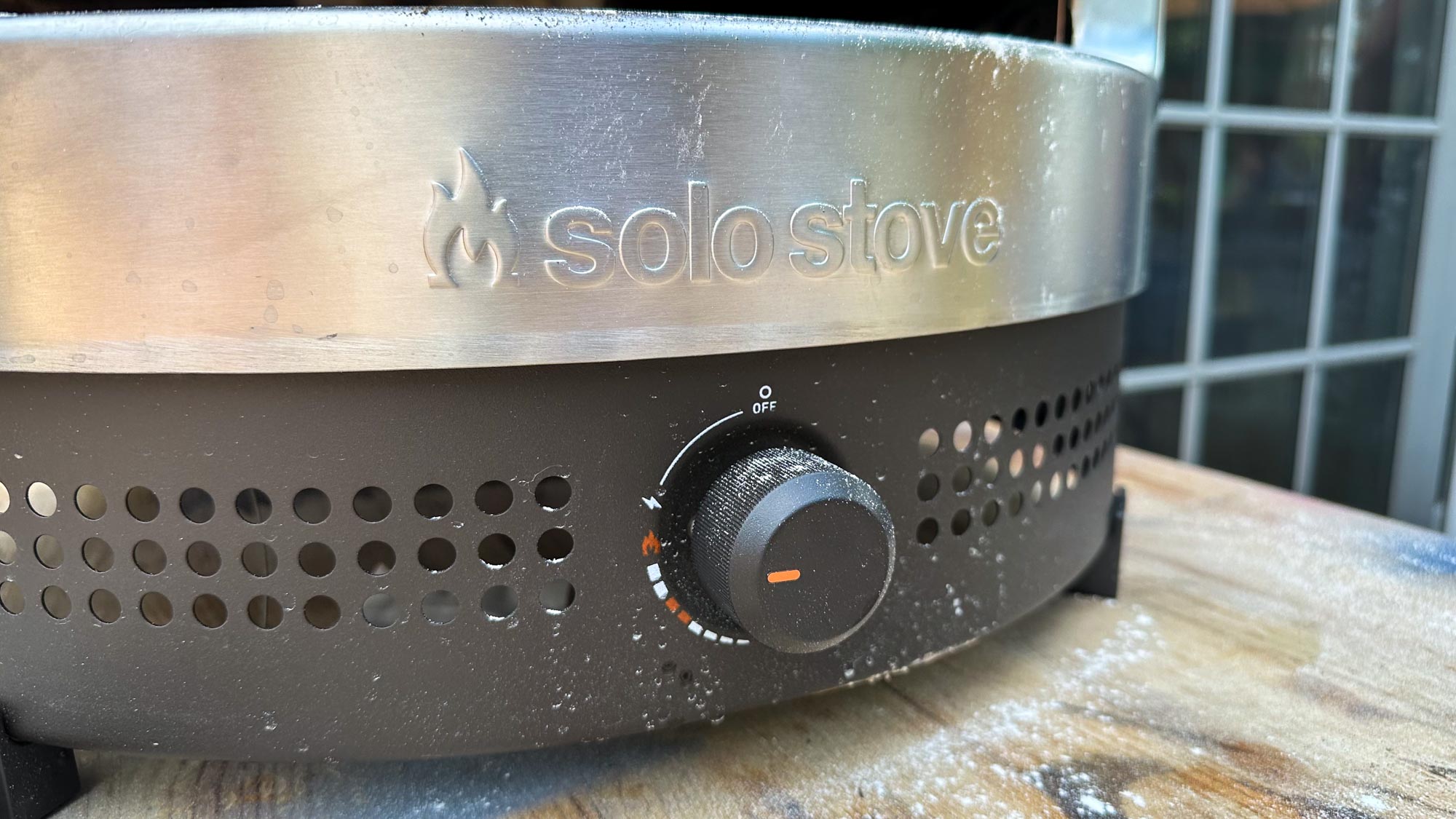
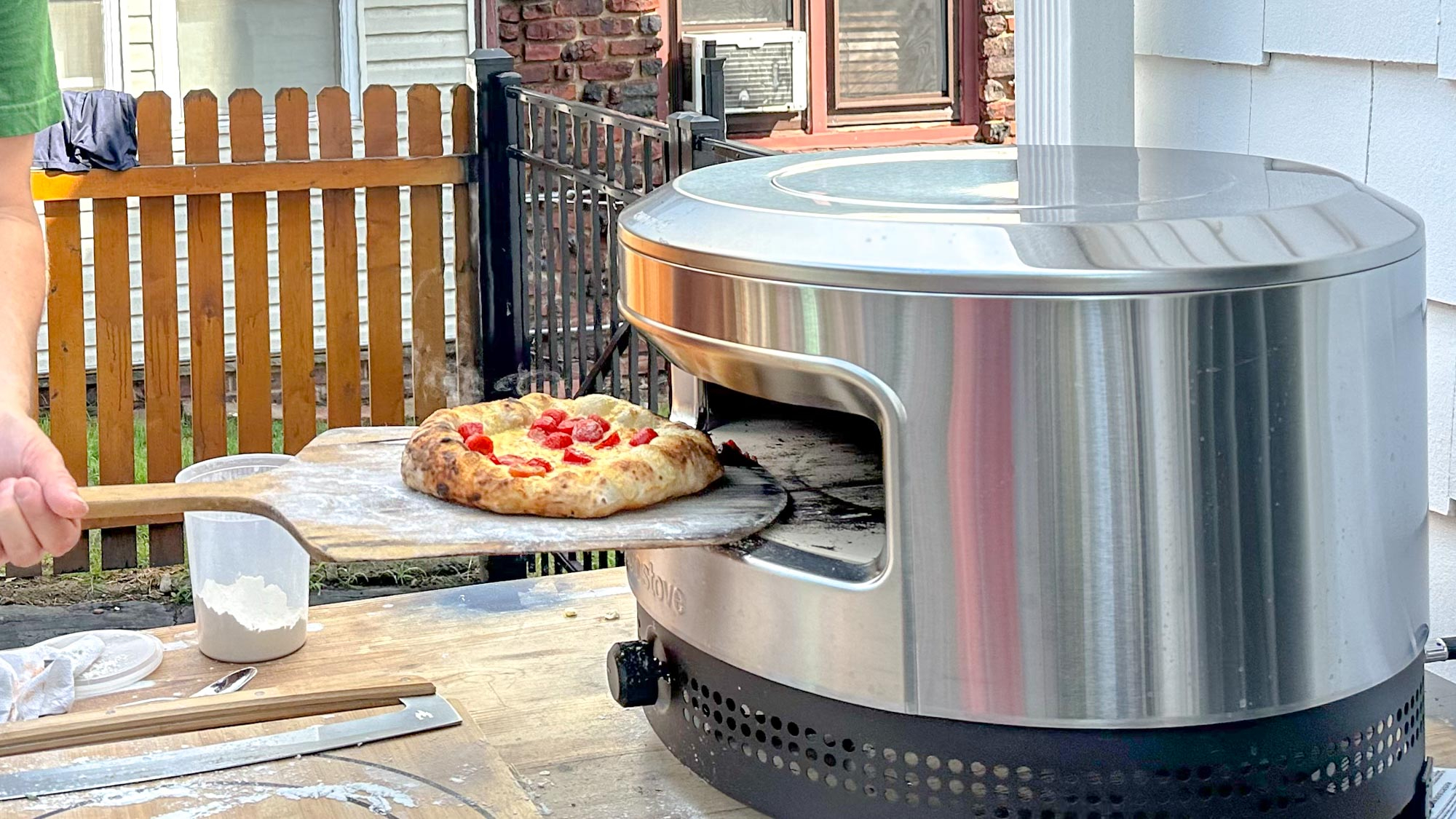
Specifications
Reasons to buy
Reasons to avoid
If you're new to making your own pizzas, you want an oven that's easy to use and doesn't cost too much; that's why we think the Solo Stove Pi Prime is the best pizza oven for beginners. At $349, it's one of the cheaper ovens around, and it's incredibly simple to set up and operate. Simply place the stone inside the oven and connect a propane tank, and you're ready to go.
We liked that its gas control knob was on the front, so you could adjust the flame without fuss. It gets really hot — we found it could bake a pizza in as little as 90 seconds — yet you can dial the temperature down enough to sear steaks so that they're perfectly charred on the outside, with a nice medium rare finish on the inside. There's not a lot of insulation around the exterior of this stainless steel oven, so you need to be a little cautious if you have little ones around.
While more advanced pizzaiolos may prefer the versatility of ovens that can use wood and charcoal, such as the Ooni Koda, those just starting on their journey will appreciate the Pi Prime's simplicity, as we did.
Read our full Solo Stove Pi Prime review.
Best premium pizza oven
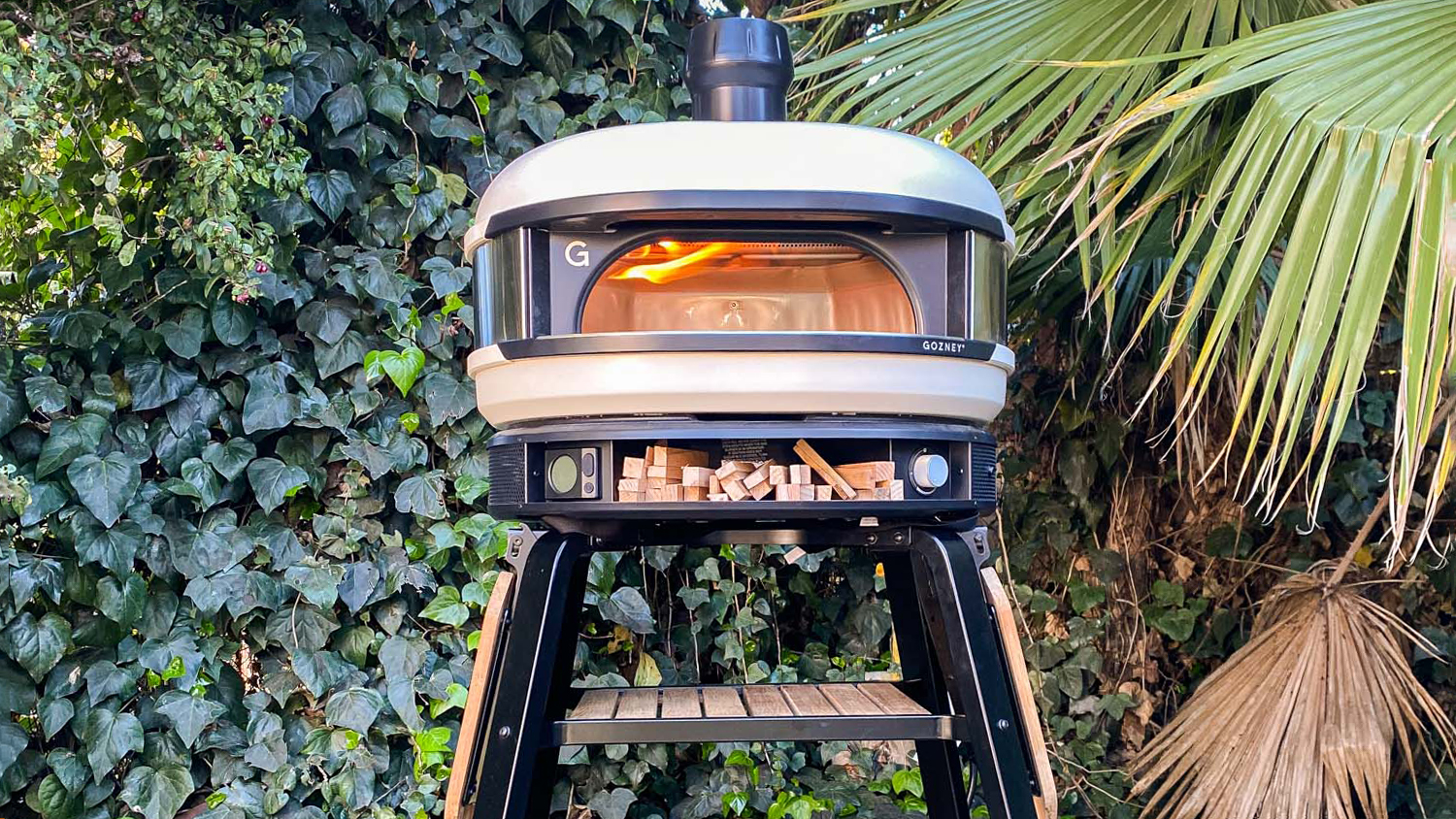
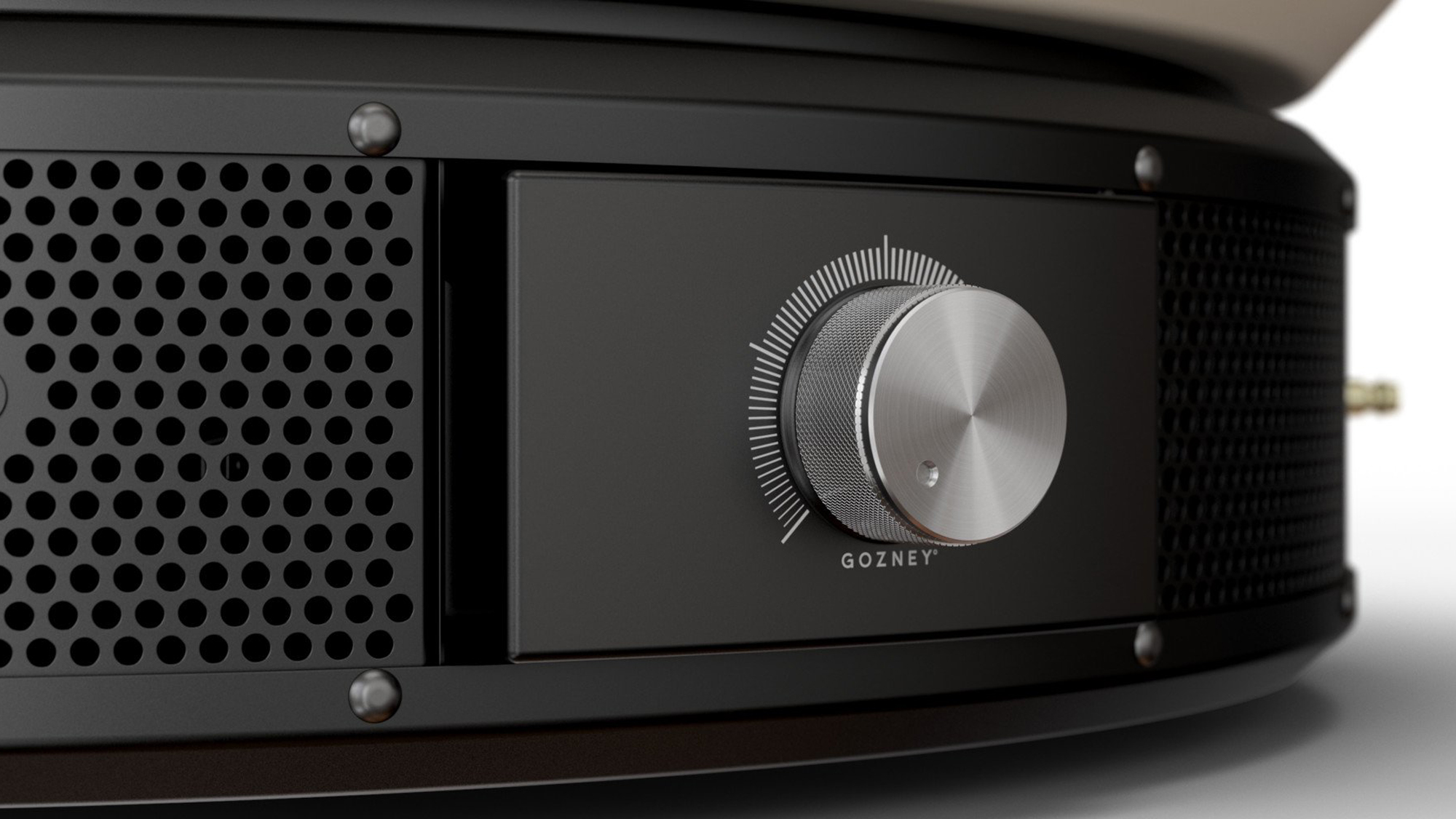
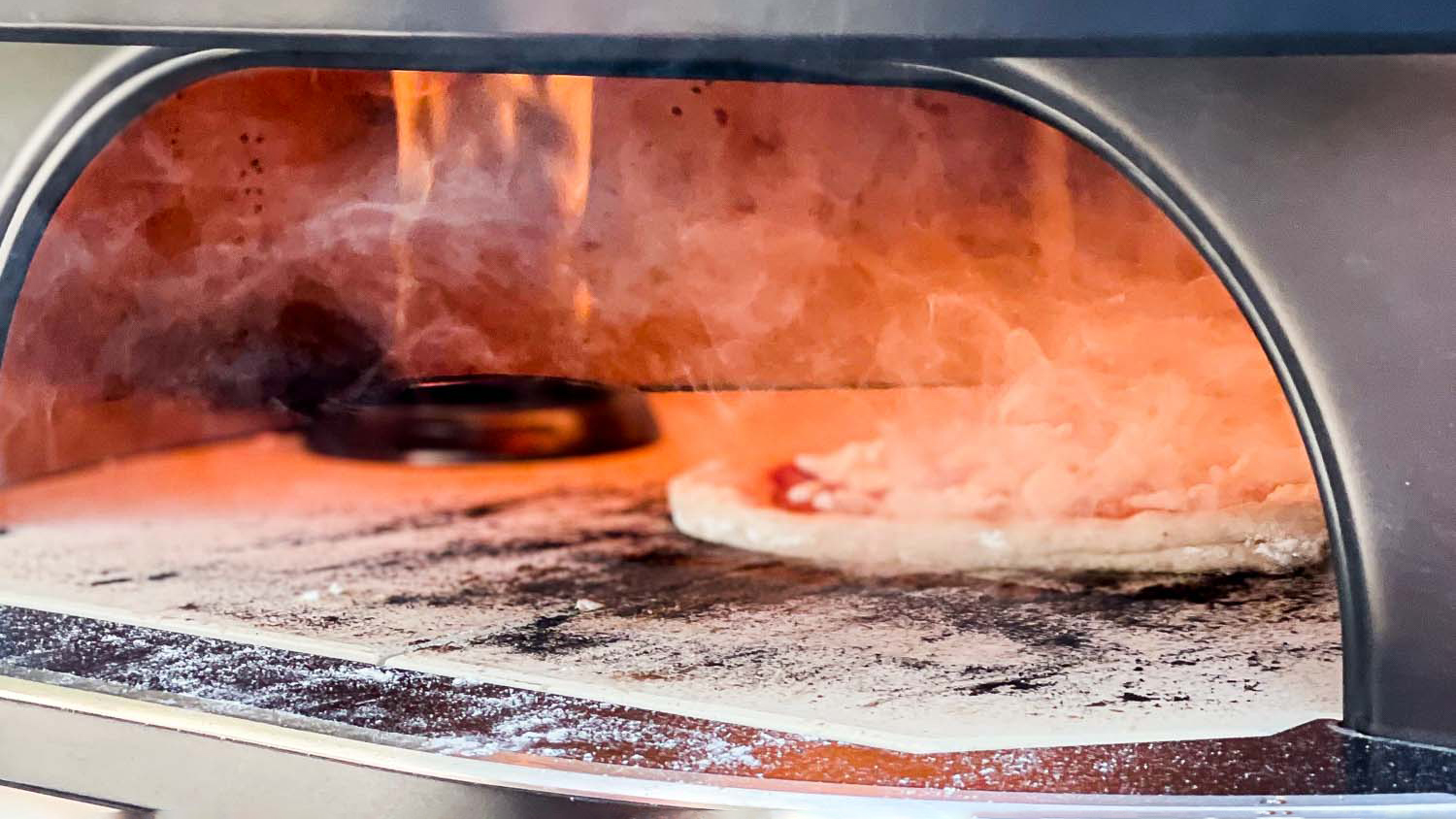
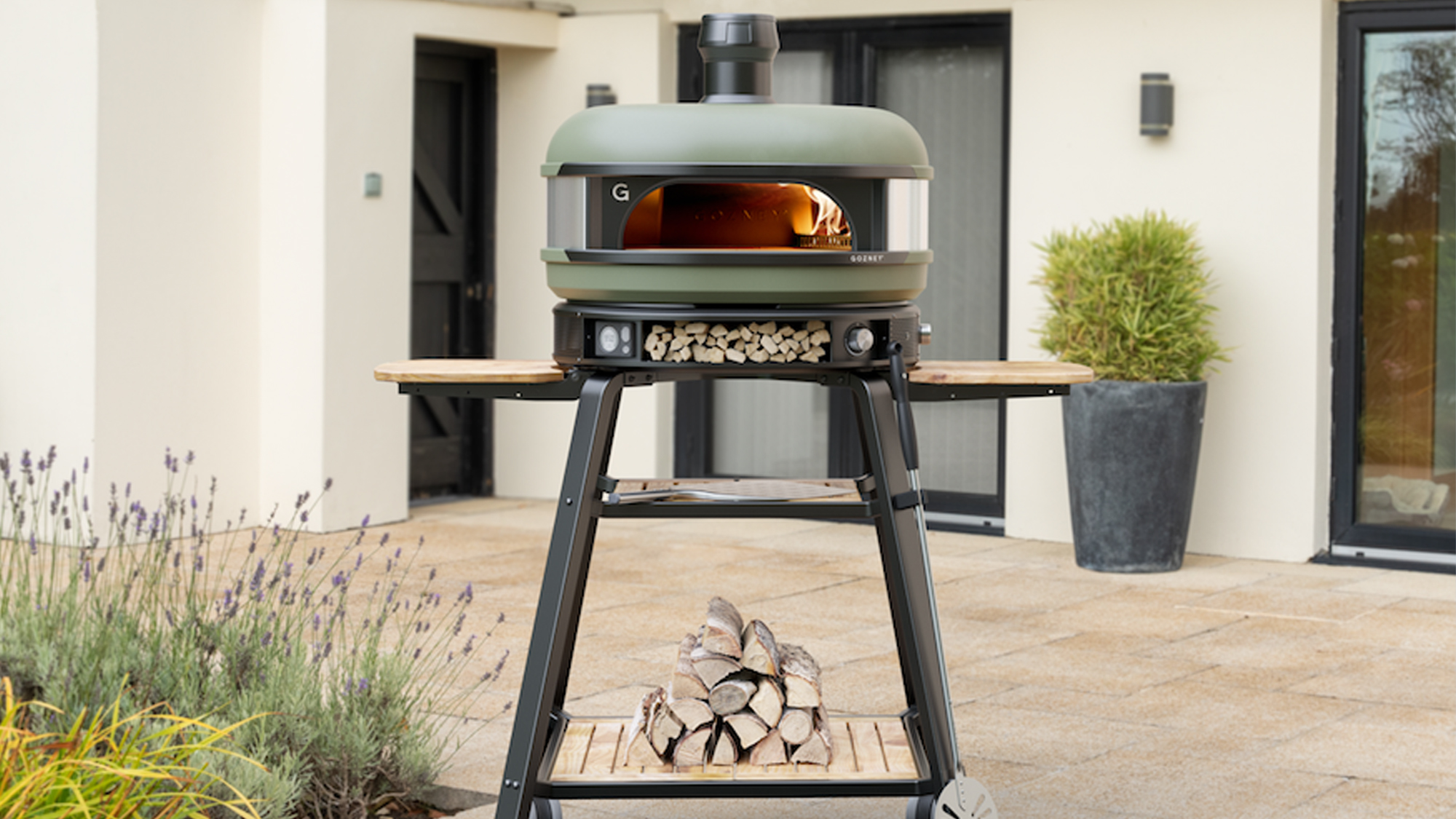
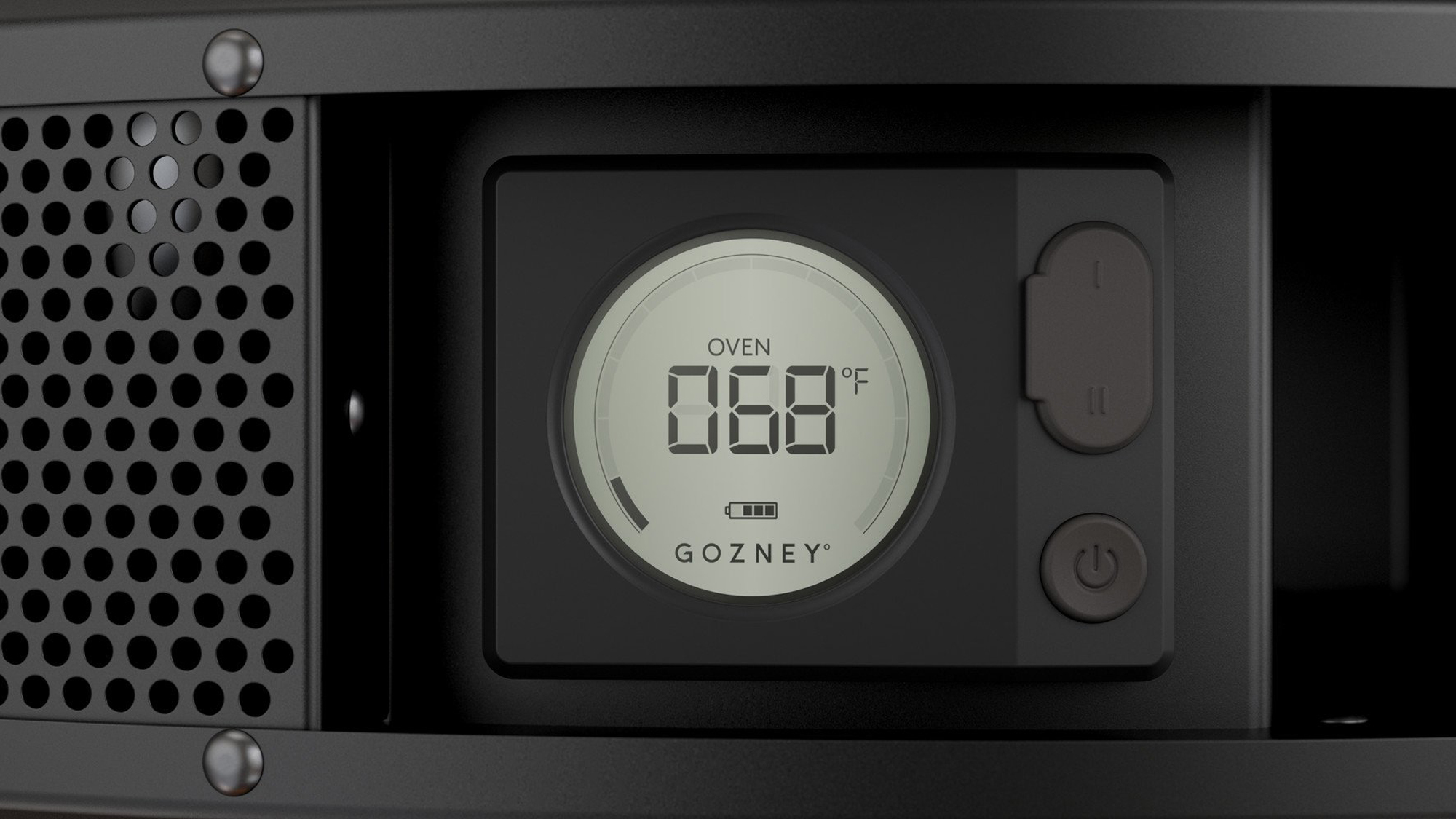
Specifications
Reasons to buy
Reasons to avoid
The Gozney Dome is the much larger, much more versatile, and much more expensive brother to the company's Roccbox. Weighing in at 128 pounds and retailing for $1,499 ($1,799 for the dual-fuel option), this pizza oven can't be moved easily, but it can cook with both wood and propane, and its large opening means you can cook more than just pizzas in this oven.
Despite its size, we liked the look of the Gozney Dome — it's one of the best-designed pizza ovens there are— as well as the fact that it could get up to scorching hot temperatures and stay there for as long as we were slinging pies. And, the pizzas it made were impressive: great charring all around, and just two minutes from start to finish.
If you like the look of the Gozney Dome, but can't swing the dough, the Gozney Arc is about a third of the price (and half the weight), yet turns out pizzas just as nice. The main compromise is that the Arc is a propane-only oven, whereas the Dome can also use wood as a fuel source.
Read our full Gozney Dome review.
Most portable pizza oven
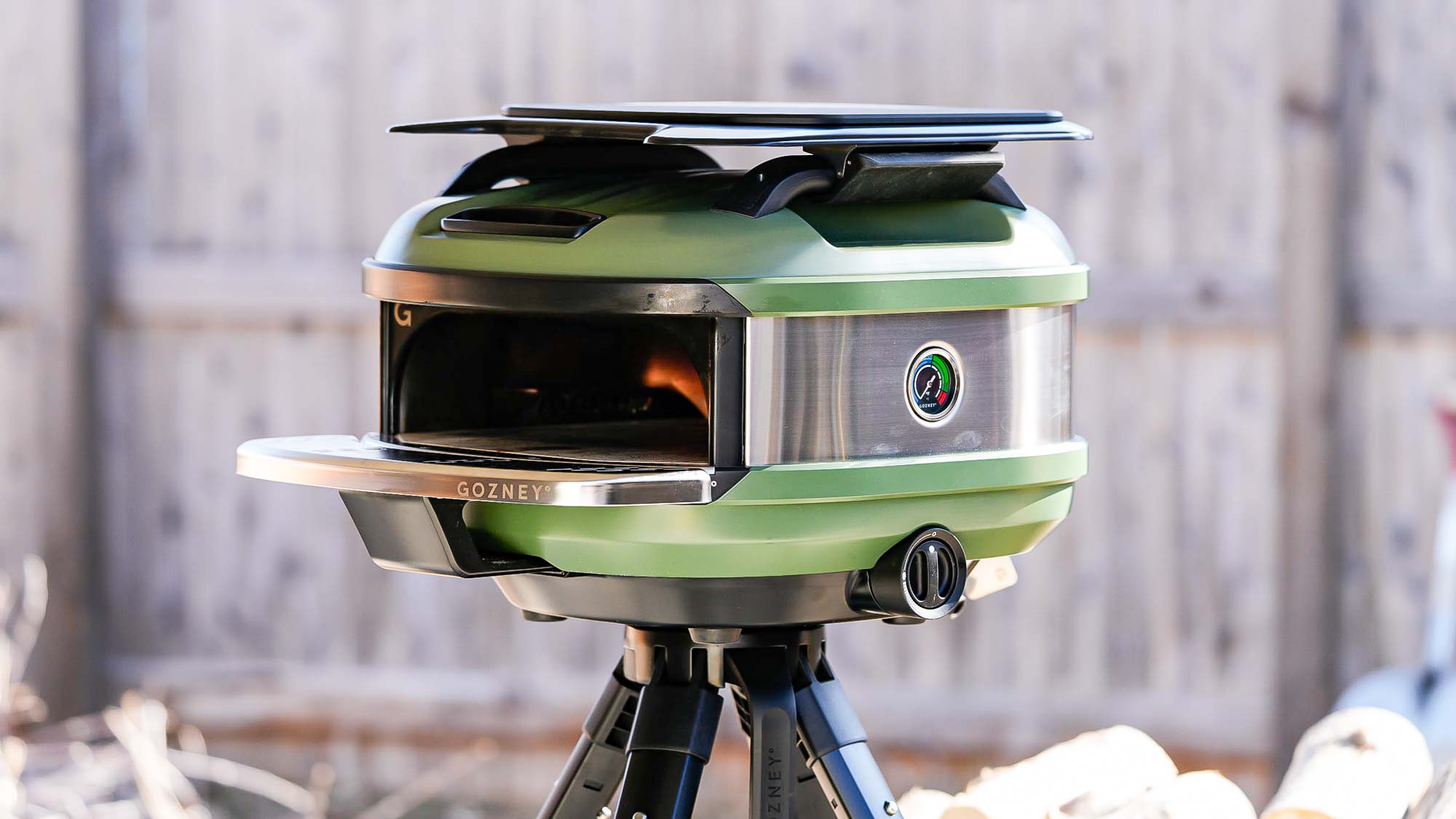
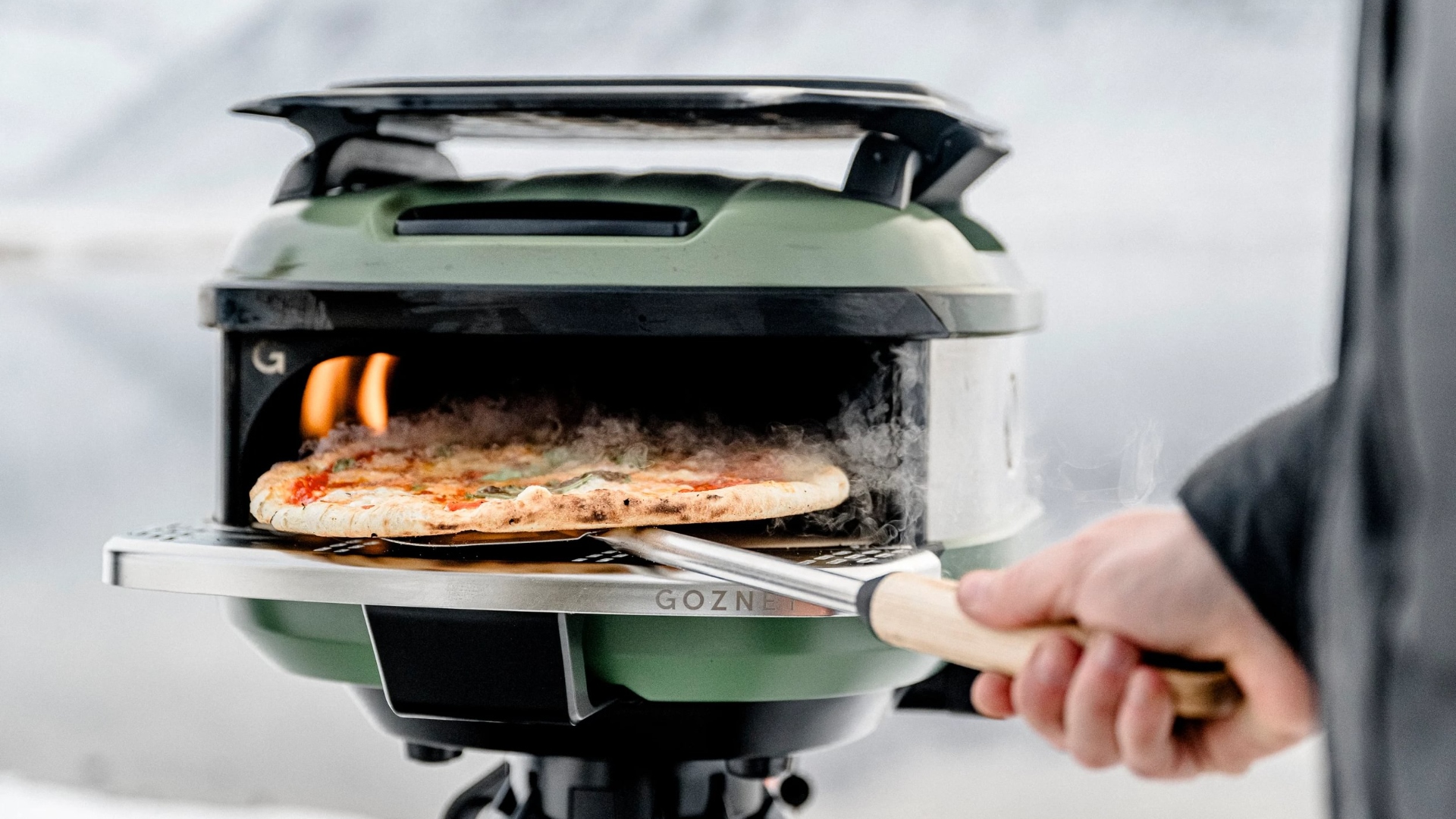
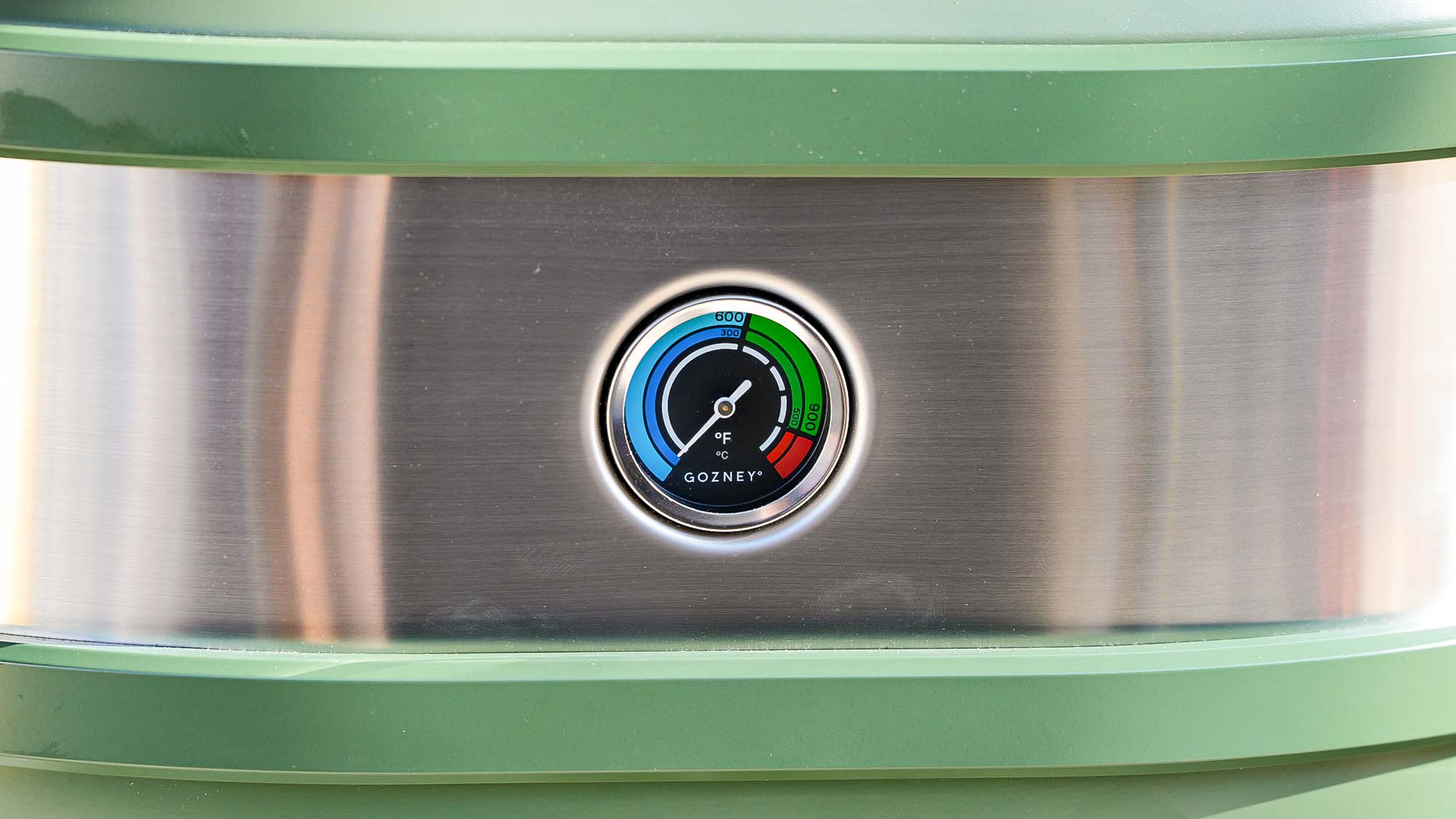
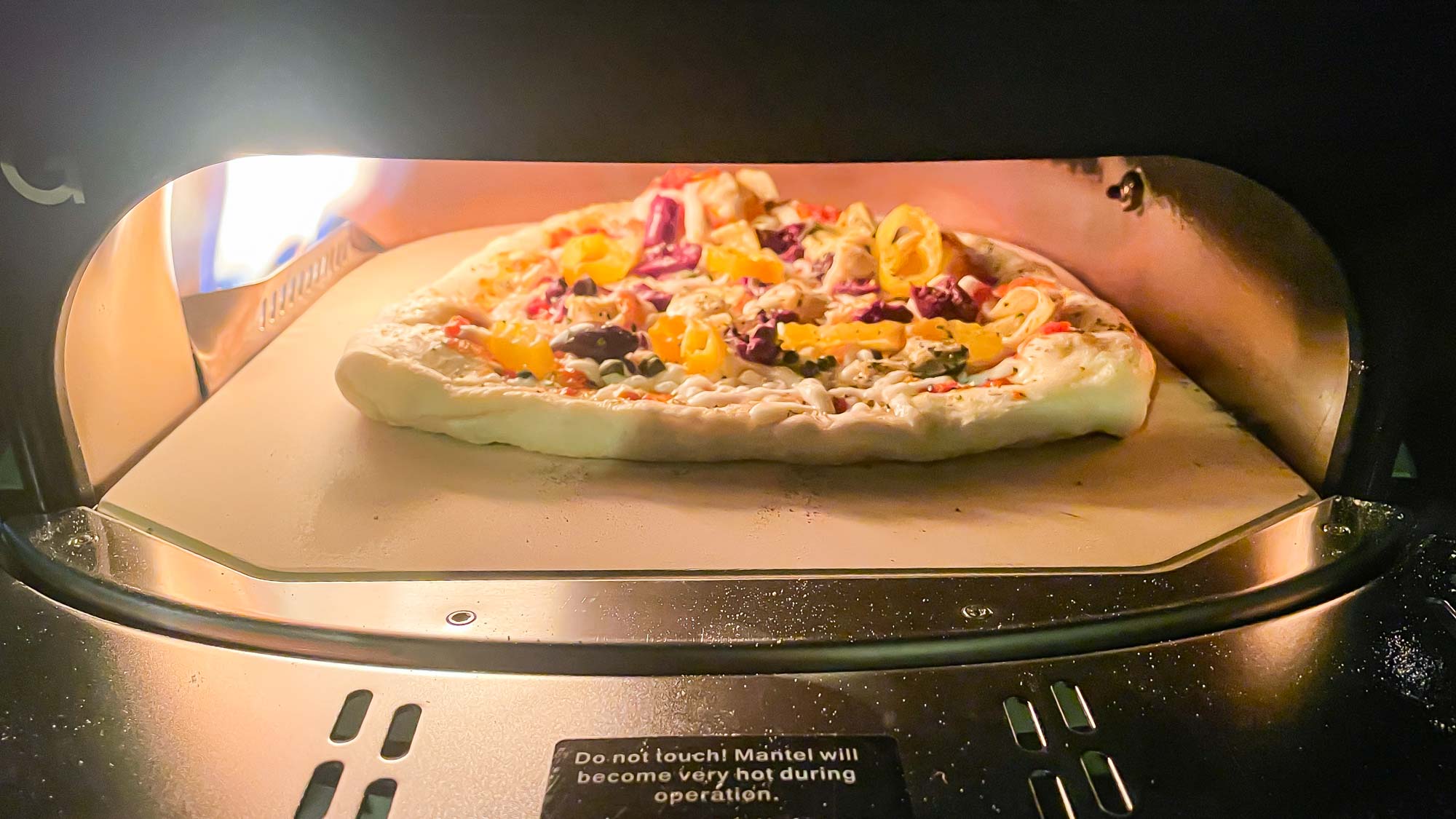
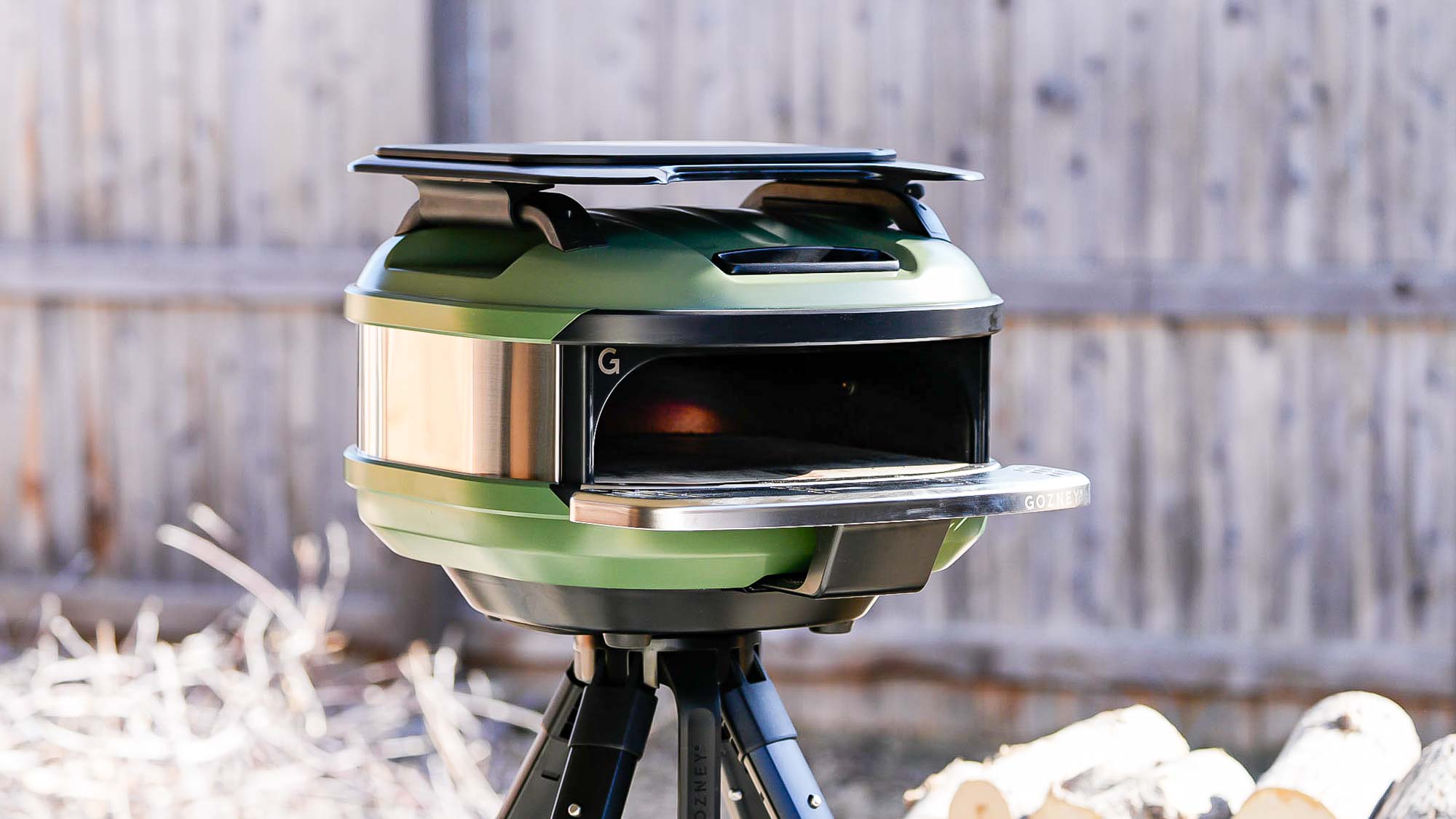
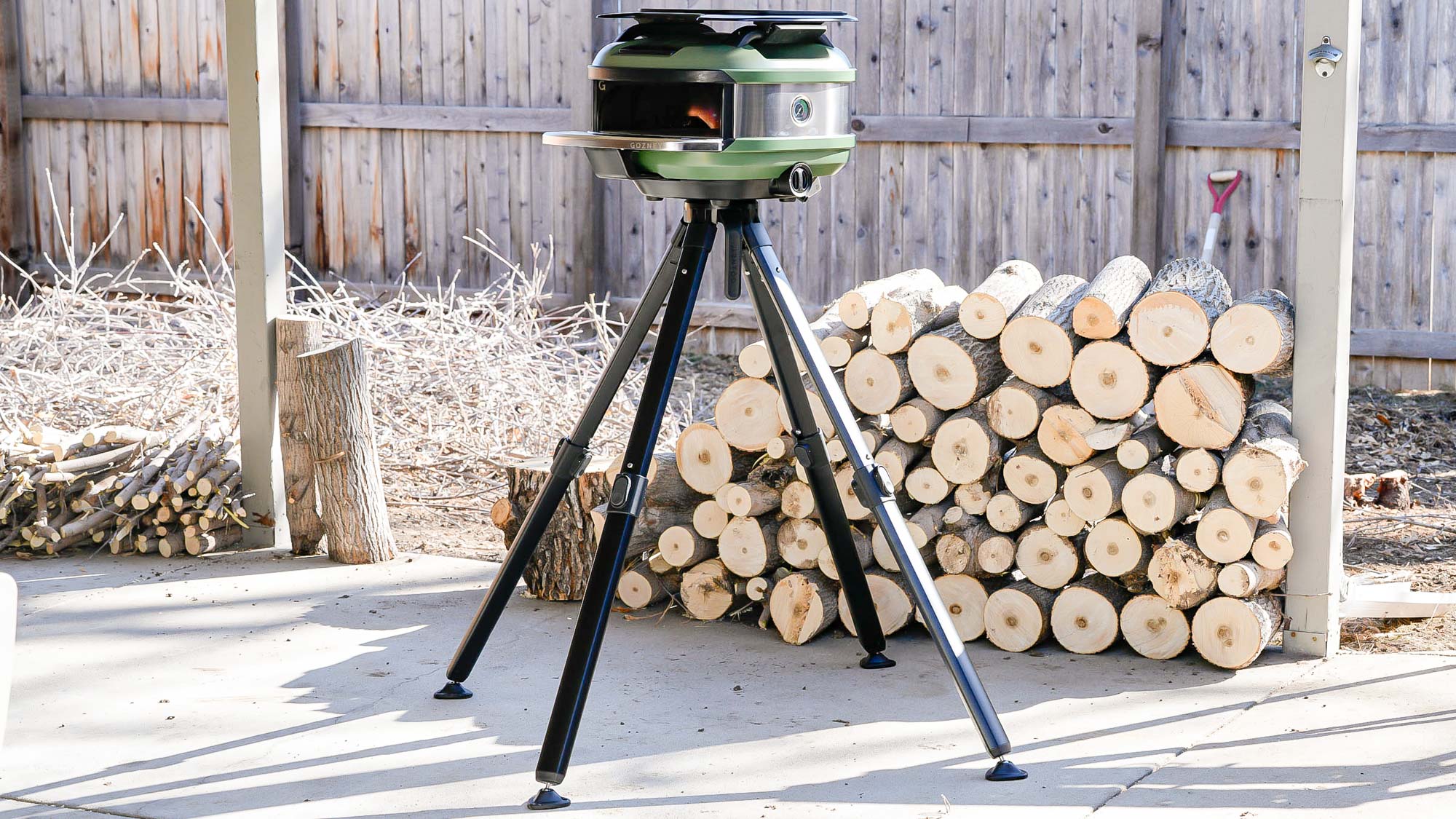
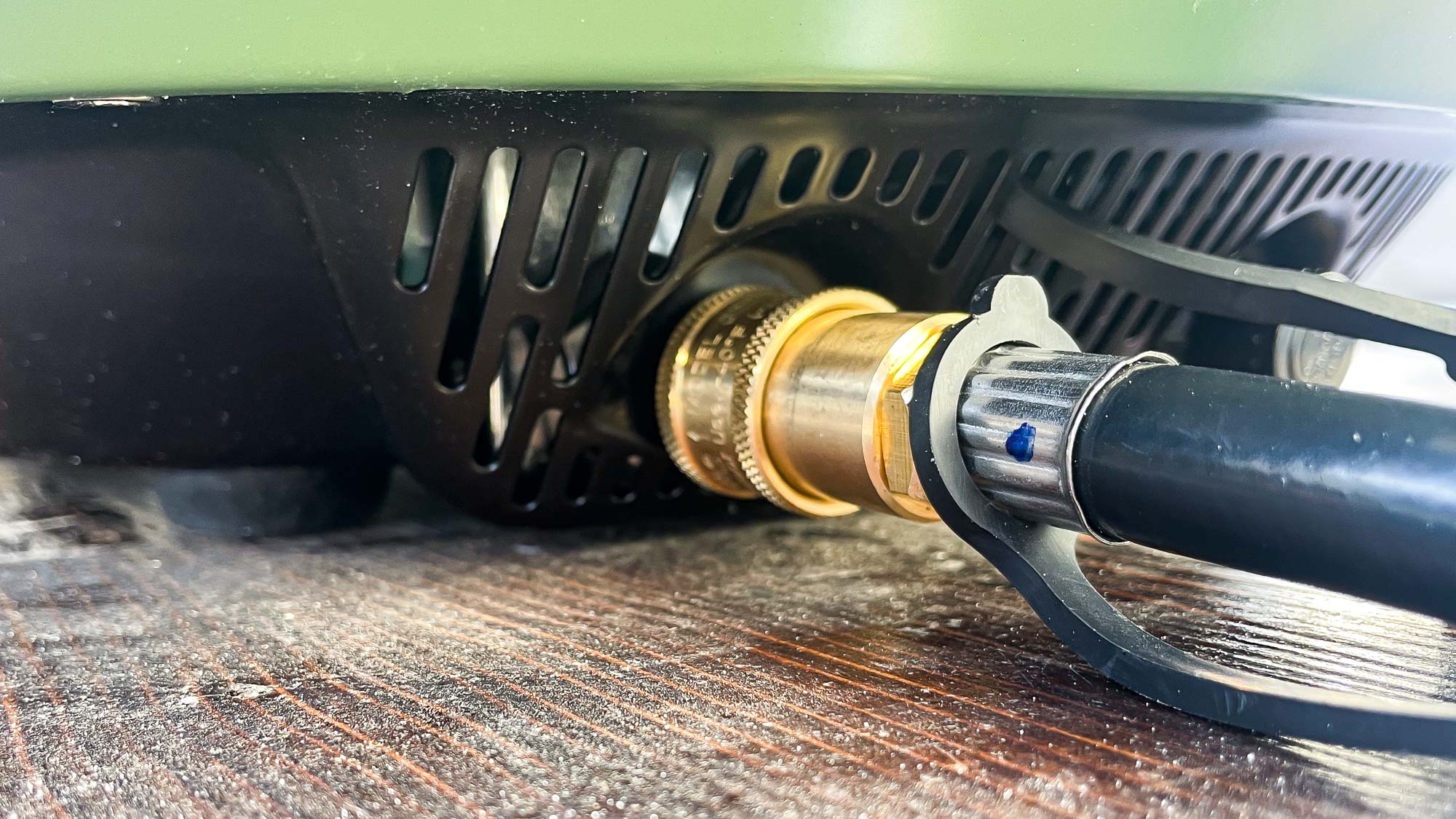
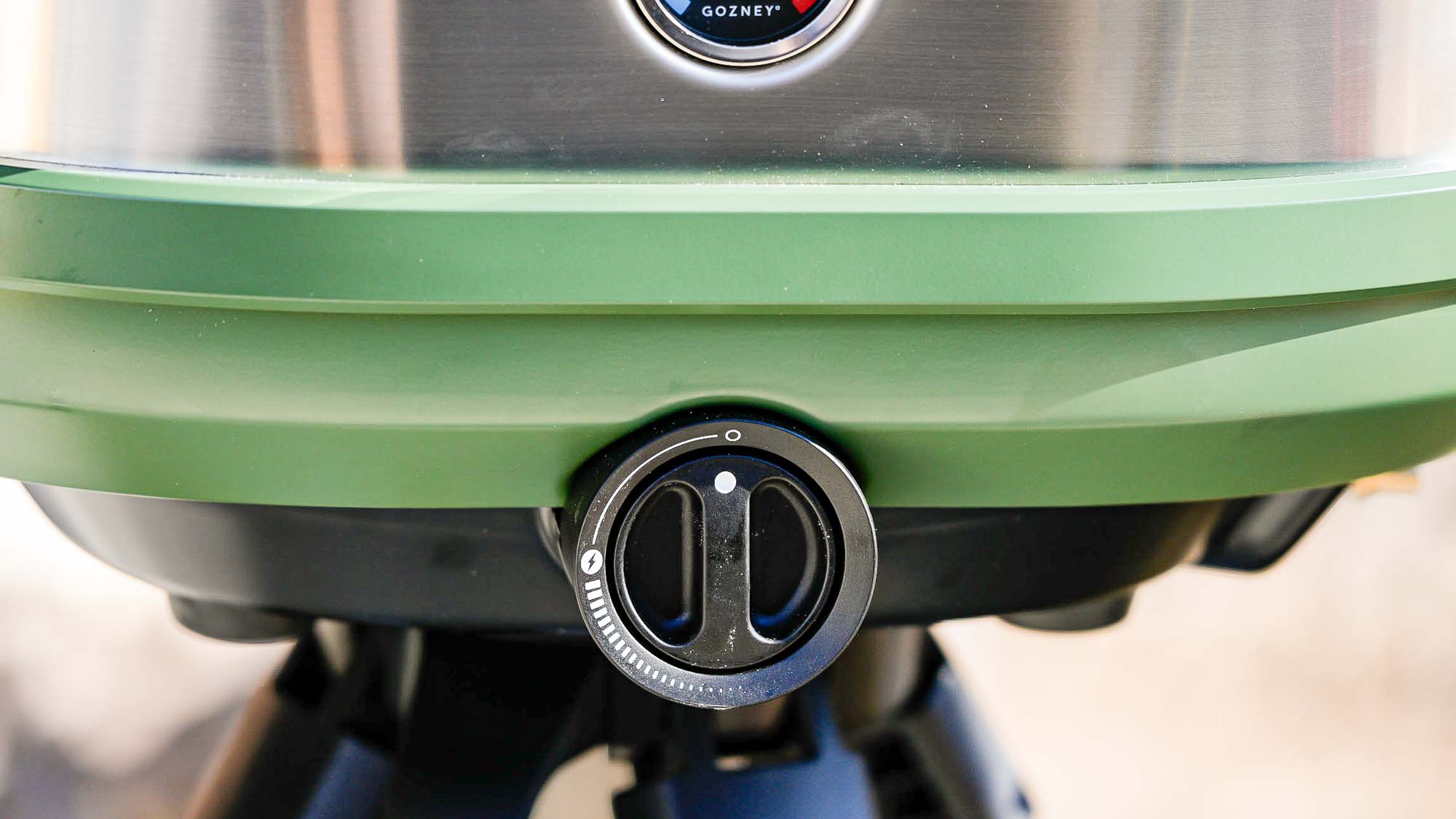
Specifications
Reasons to buy
Reasons to avoid
If you're going camping or to a tailgate — or maybe you just don't have a lot of room — the Gozney Tread is the best small pizza oven we've tested. This model, which runs on propane, weighs a shade under 30 pounds, but can make pizzas with the best of them.
Like Gozney's other models, the Tread is a real looker, and unlike most other pizza ovens, you can choose its finish: olive or off-black. We also liked its small built-in thermometer; while you should always use a laser thermometer to check the temperature of the pizza stone itself, the built-in gauge is handy for knowing just how hot things are at a glance.
The temperature control on the Tread was also easy to use — it's a small dial on the side — which proved crucial, as you'll want to adjust the flame before and after baking your pies to avoid a burned crust — something that happened to us the first time we used the oven. As with most of the other ovens we've tested, the Tread can reach temperatures in excess of 900º F, ideal for making Neapolitan pizzas and getting a real sear on your steaks.
However, the Gozney Tread costs $500, which is on the more expensive side for pizza ovens this size; if you're looking for something less expensive but equally portable, the Ooni Karu 12 costs $299 (add $100 if you want the adapter to use it with propane), and the Solo Stove Pi Prime is $349. Neither look as stylish as the Gozney, though.
Read our full Gozney Tread review.
Best multifuel oven
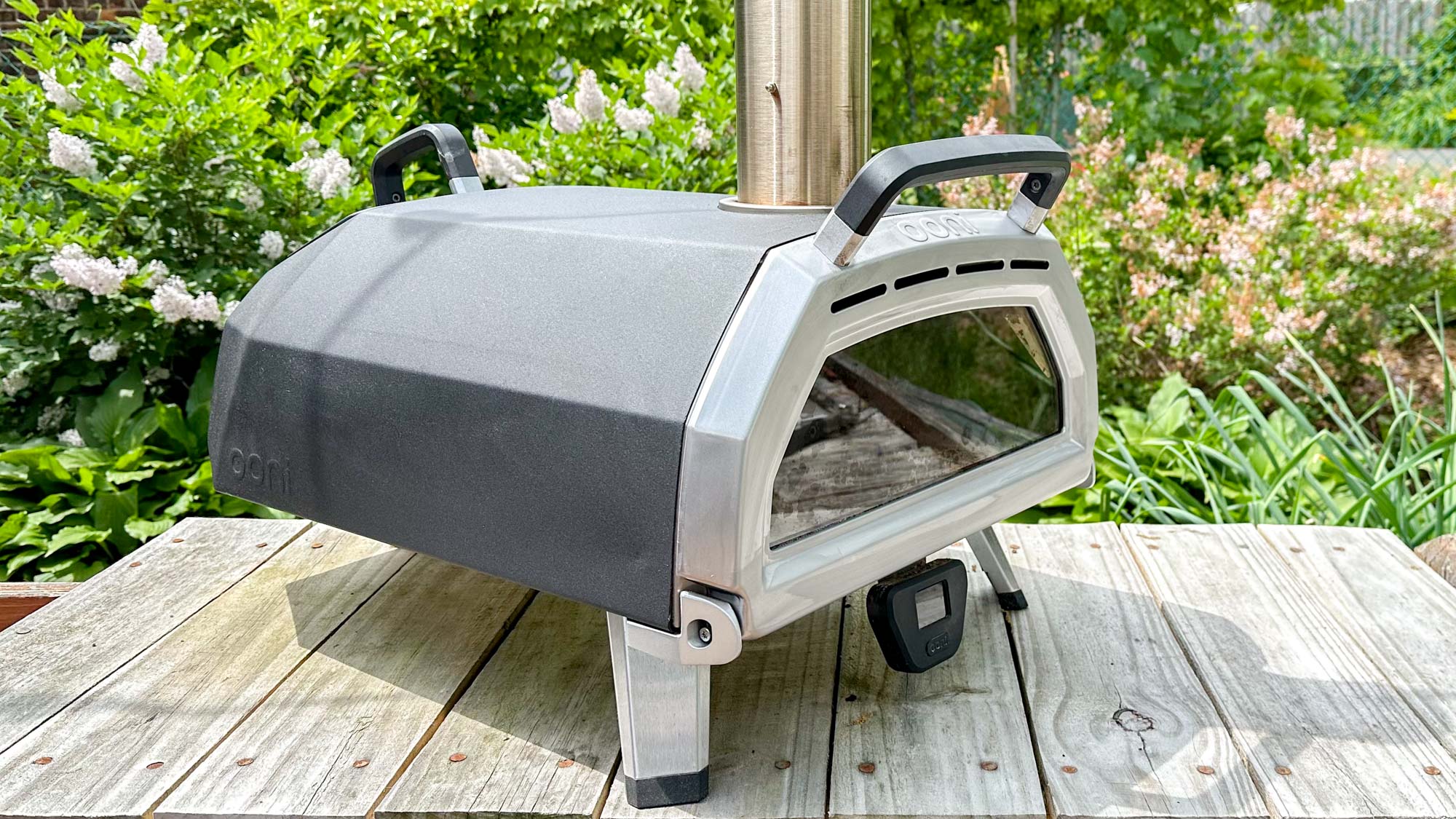
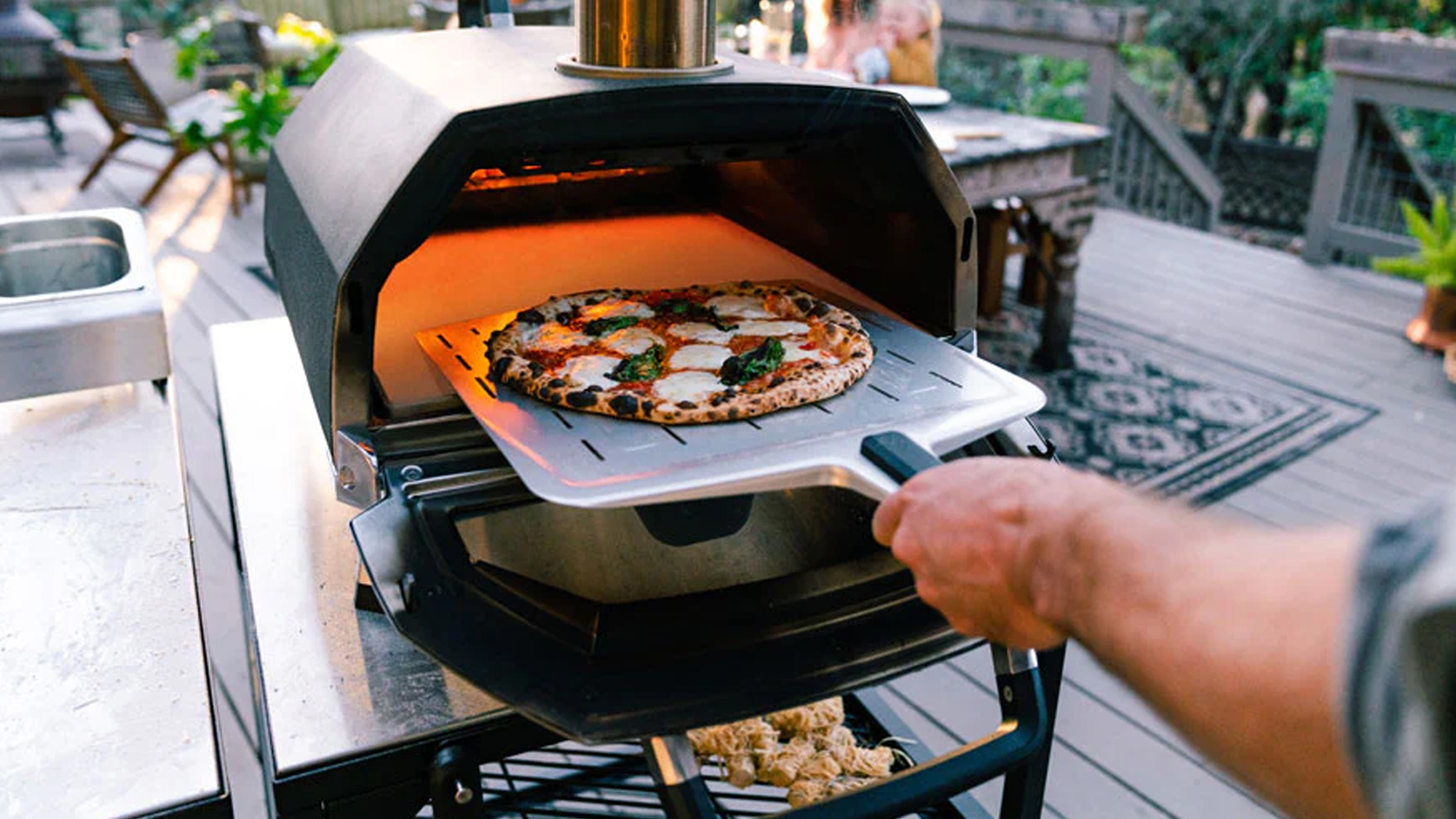
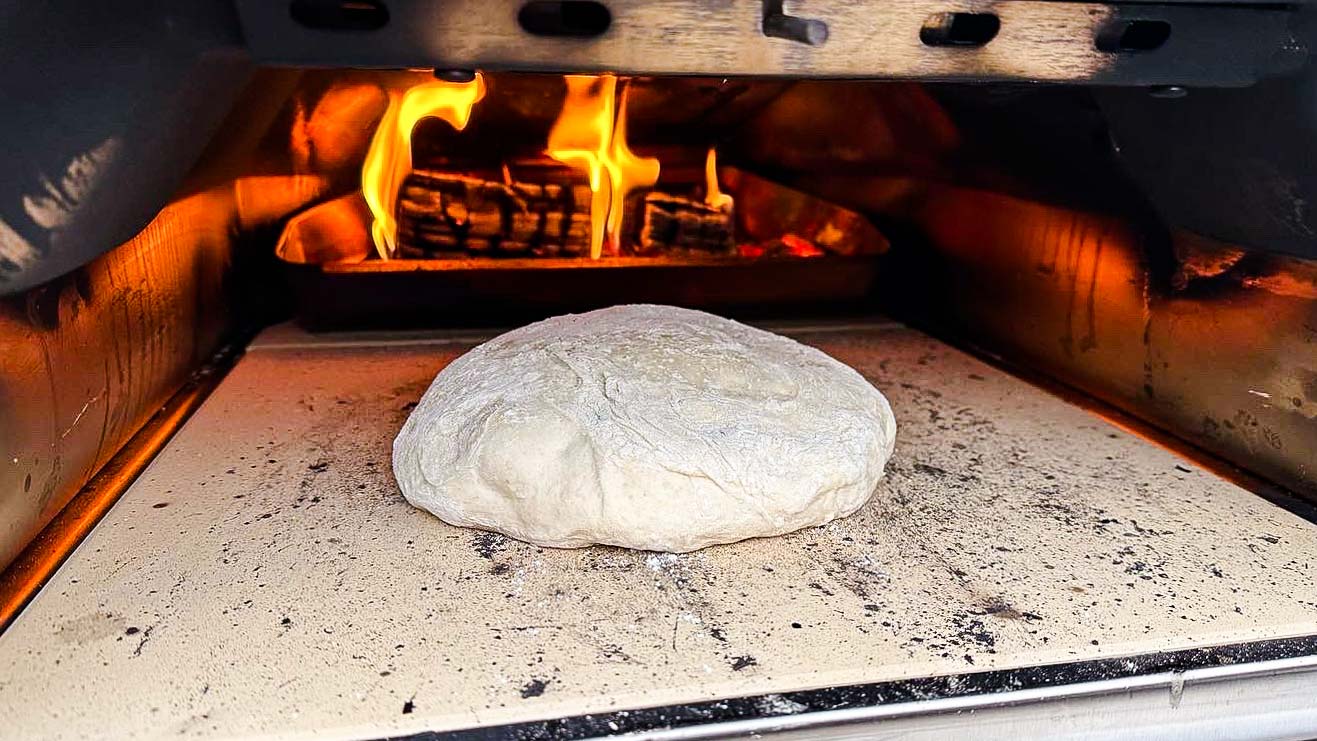
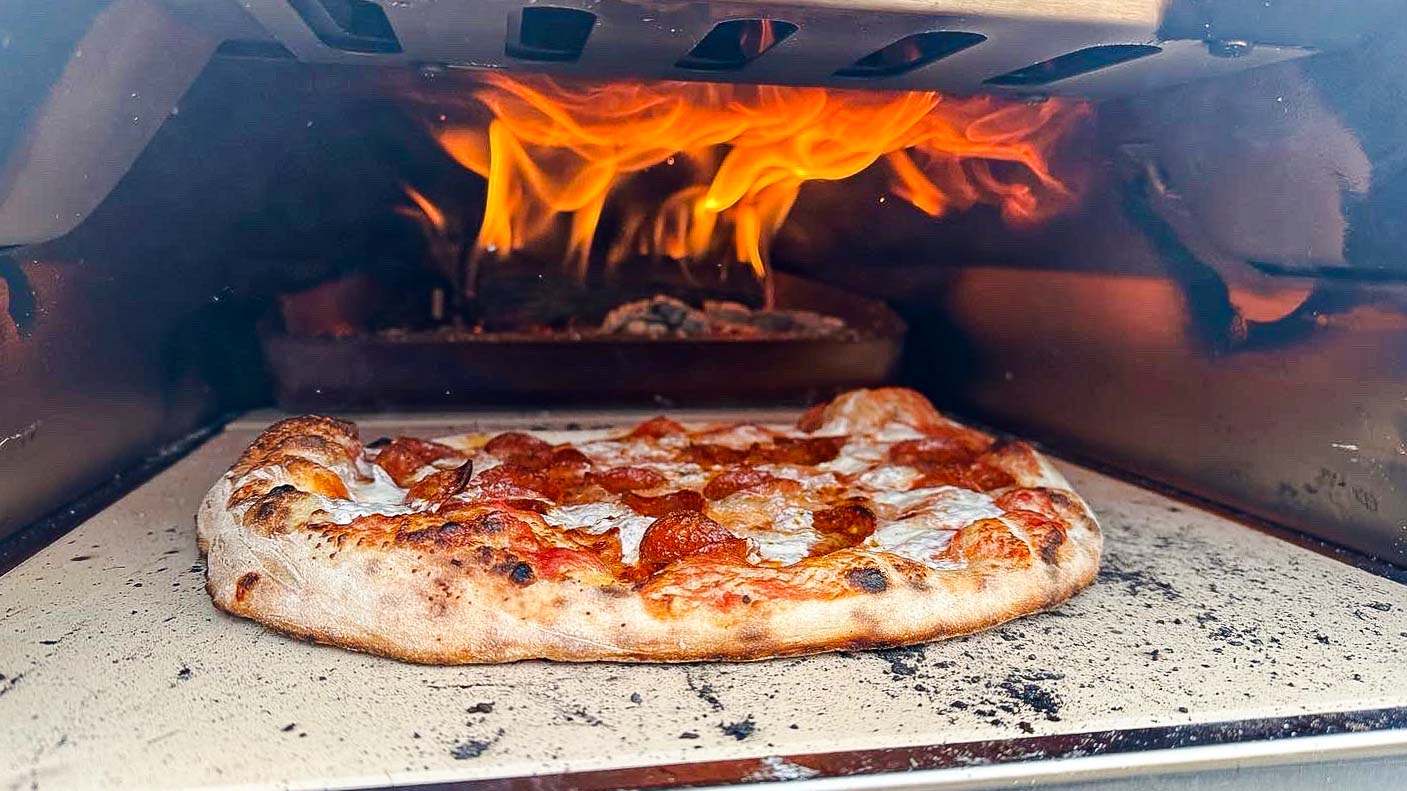
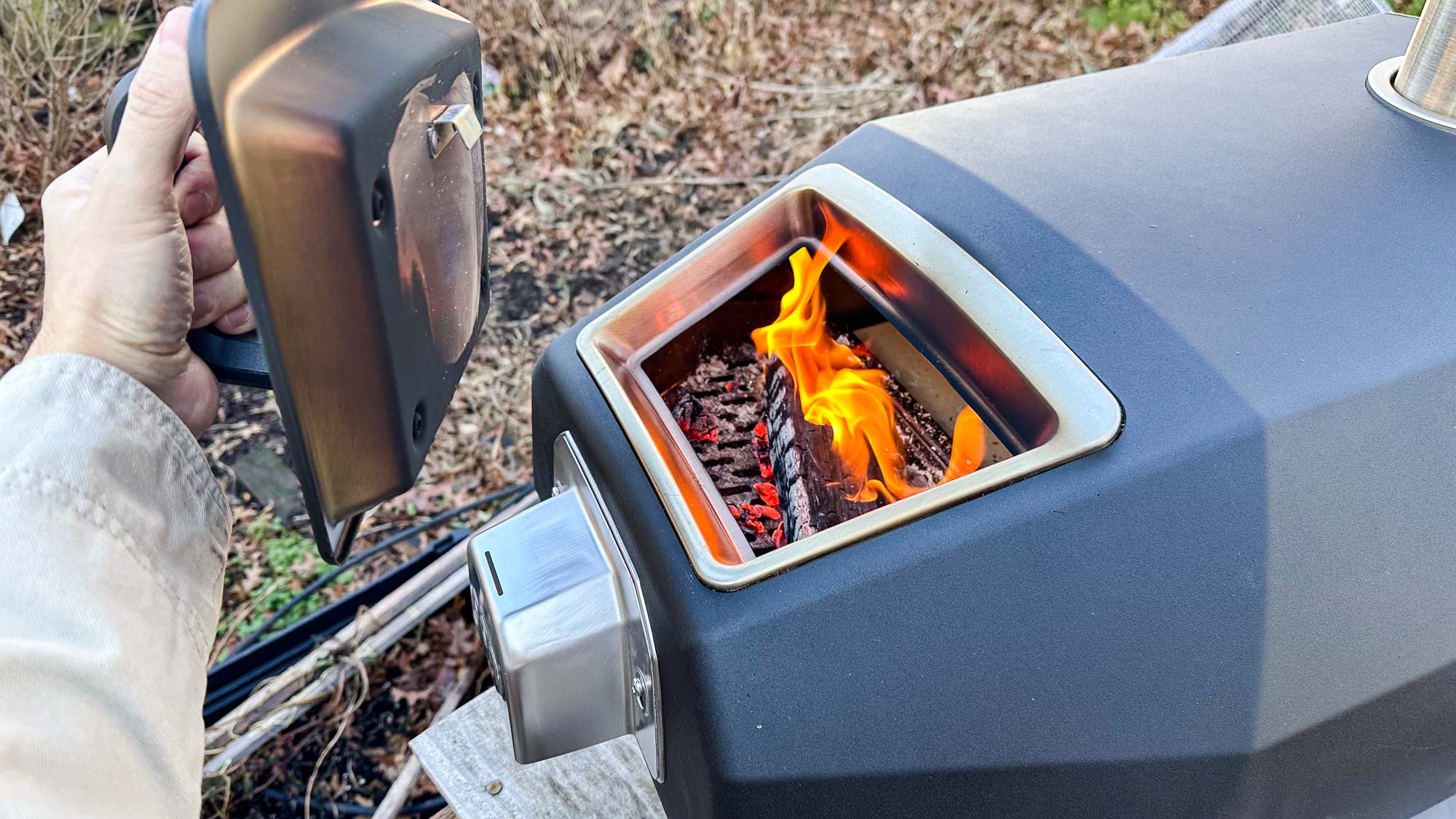
Specifications
Reasons to buy
Reasons to avoid
With its large cooking area and ability to use gas, wood, or charcoal as a fuel source, the Ooni Karu 16 is one of the best outdoor pizza oven we've tested. At $800 — not counting the cost of the gas attachment — it's not cheap, but it's the most versatile oven we've used. The larger chamber of the Karu 16 also means you can cook stuff other than pizza, such as bread or other taller items.
Thanks to its large rear handle and door, we found it was easy to load wood into the Karu 16's fire box and keep the oven humming along at 900 degrees Fahrenheit, and the built-in thermometer made it easy to keep tabs on how hot it was inside. The Karu 16's glass door also let us check at a glance how our pizzas were cooking, another nice touch.
There's really not much we didn't like about the Karu 16 — it's on the heavy side, so you won't want to move it around a lot — but you should be as pleased with the results as we were.
Editor's note: The Karu 16 has been replaced with the Karu 2 Pro, which has a similar design, but now has a color temperature display and a slightly larger cooking area.
Read our full Ooni Karu 16 review.
Best grill attachment
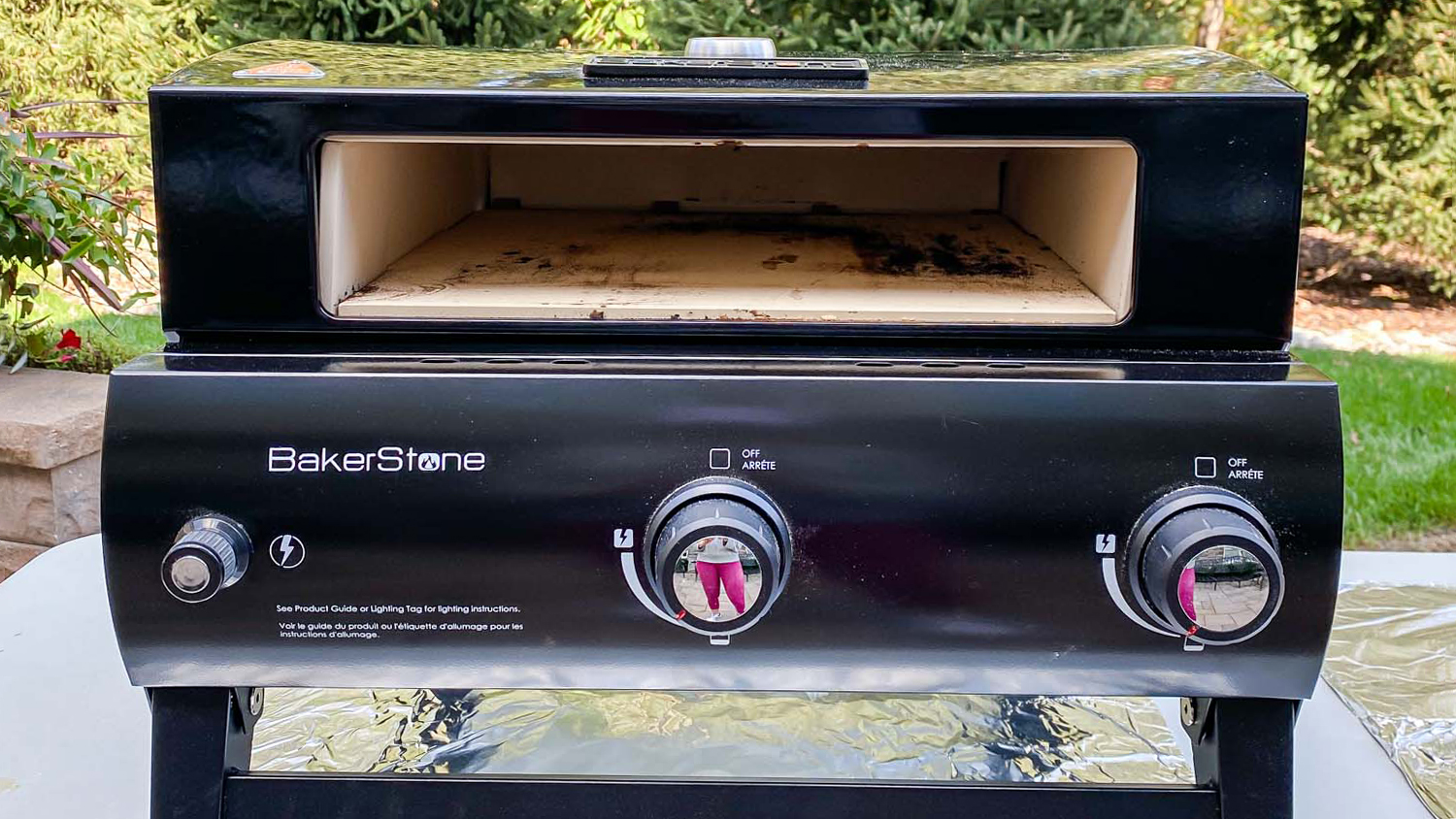
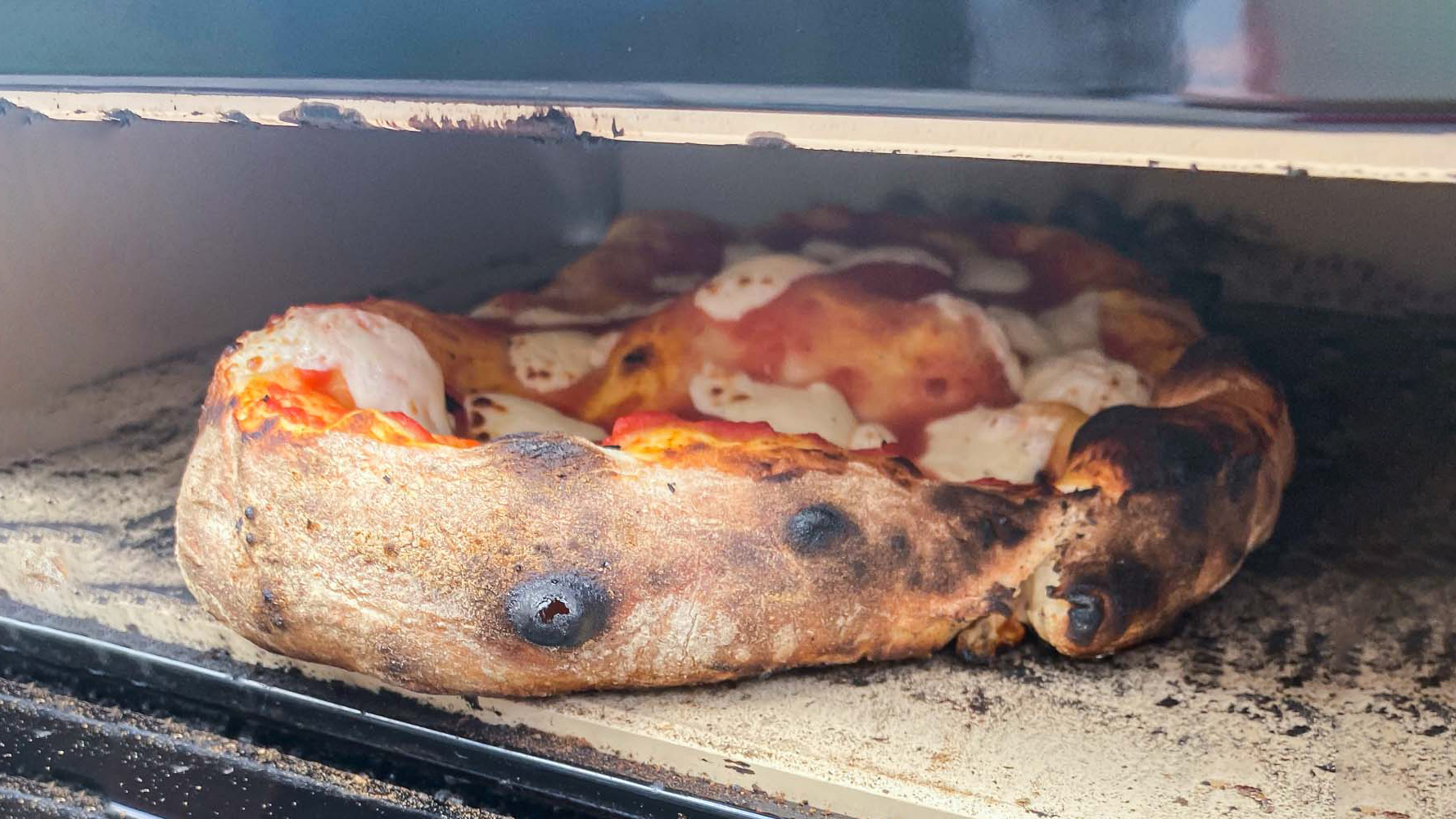
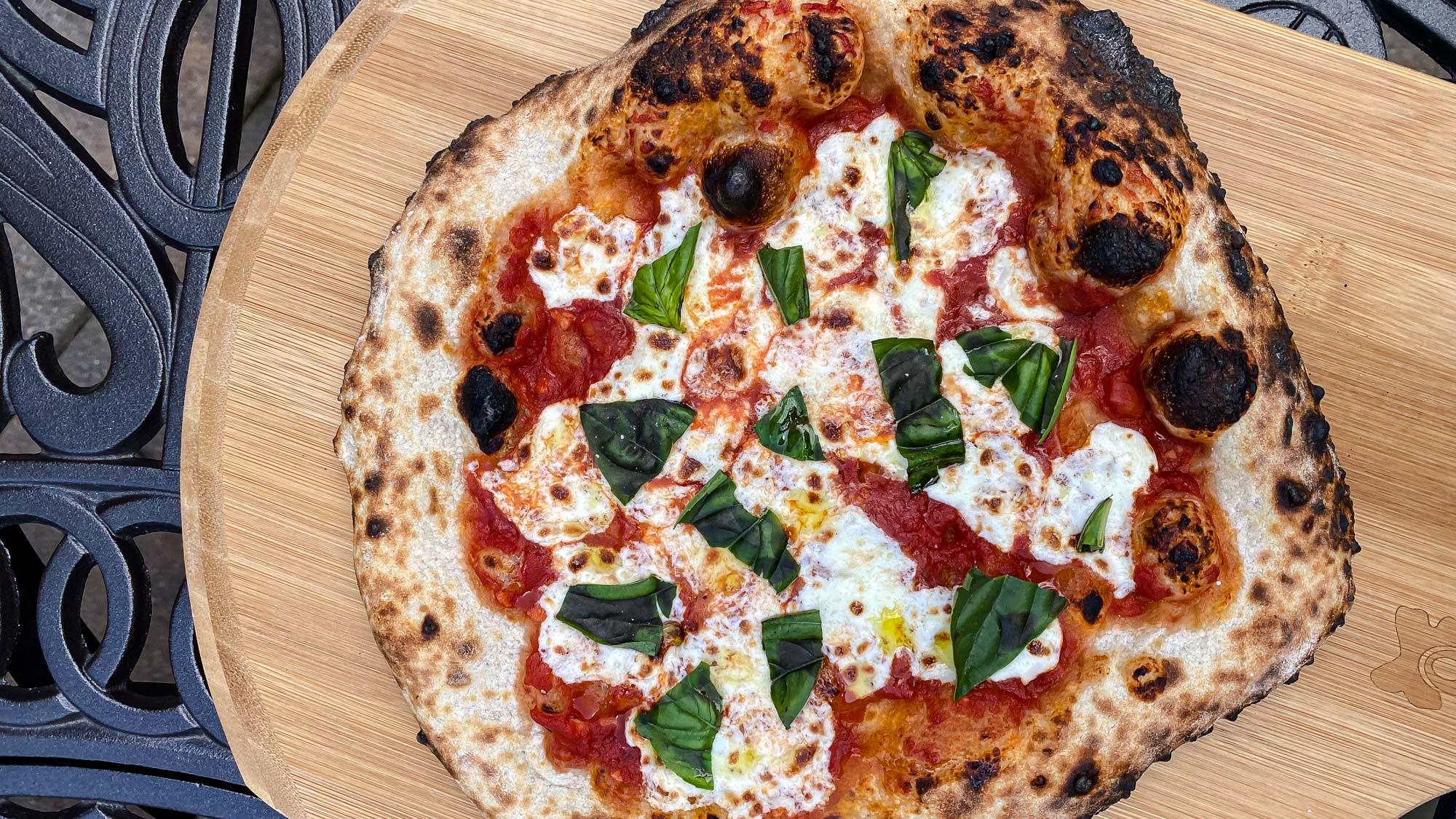
Specifications
Reasons to buy
Reasons to avoid
The BakerStone Pizza Oven Box pulls double duty: Since it was originally designed as a box to place on a grill, you can actually detach the top portion from the bottom “firebox” and do your pizza-cooking on a grill. The interior of the oven, composed of five sides of pizza stones, performed surprisingly well when up against the open-flame Ooni Koda and Gozney Roccbox. Because the five stones maintain and radiate a lot of heat, the pizzas we made came out with a good amount of char and were cooked evenly.
We also liked that there are two gas burners within the firebox, which each have their own knob, so you can really experiment with the heat of each side of the oven. Gaze into a hole on either side of the firebox, and you can see the flames flickering away, giving a good idea of the heat they’re generating. Plus, an easy-to-read thermometer on top of the pizza box lets you keep an eye on your temperature levels while you’re cooking.
Read our full BakerStone Pizza Oven review.
Best fire pit attachment
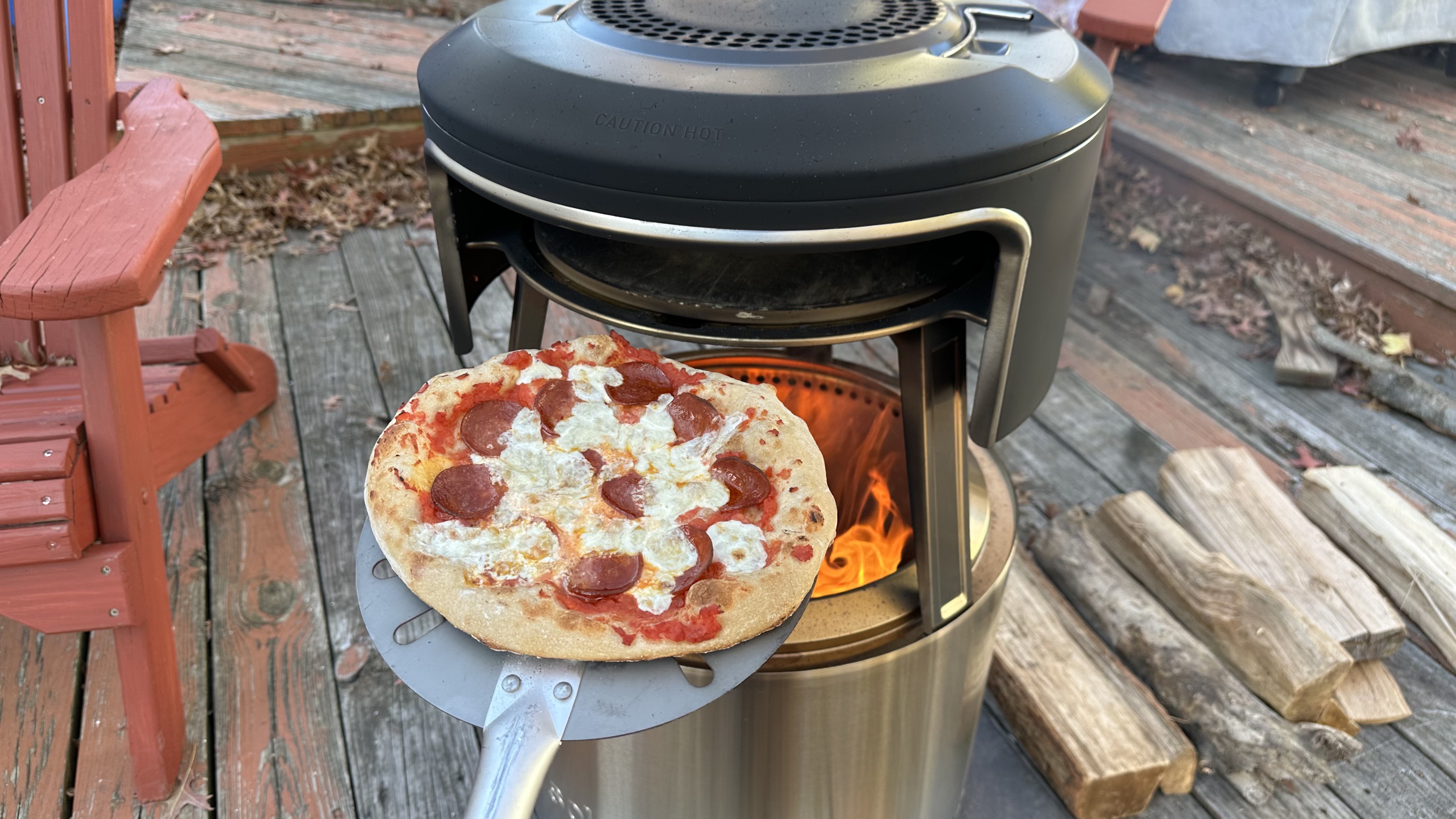
Specifications
Reasons to buy
Reasons to avoid
While Solo Stove already makes a standalone pizza oven, it has also come out with the Pi Fire, an accessory that fits atop one of the best fire pits. The Pi Fire is small and light, and has two handles at the top to let you place it atop and remove it from your Solo Stove.
Unlike the other pizza ovens on this list, the Pi Fire cooks pizzas at a much lower temperature, so it takes longer until it's ready to eat — 5 to 10 minutes, versus as little as 90 seconds. We also found that if you let the fire get too big, your pizza will get sooty — yuck! But, if you don't mind its more leisurely pace, the Pi Fire is a fun addition to your Solo Stove.
We tested the model that fits the Solo Stove Bonfire, but the company also makes versions compatible with the Yukon and Ranger fire pits.
Read our full Solo Pi Fire review.
Best electric oven
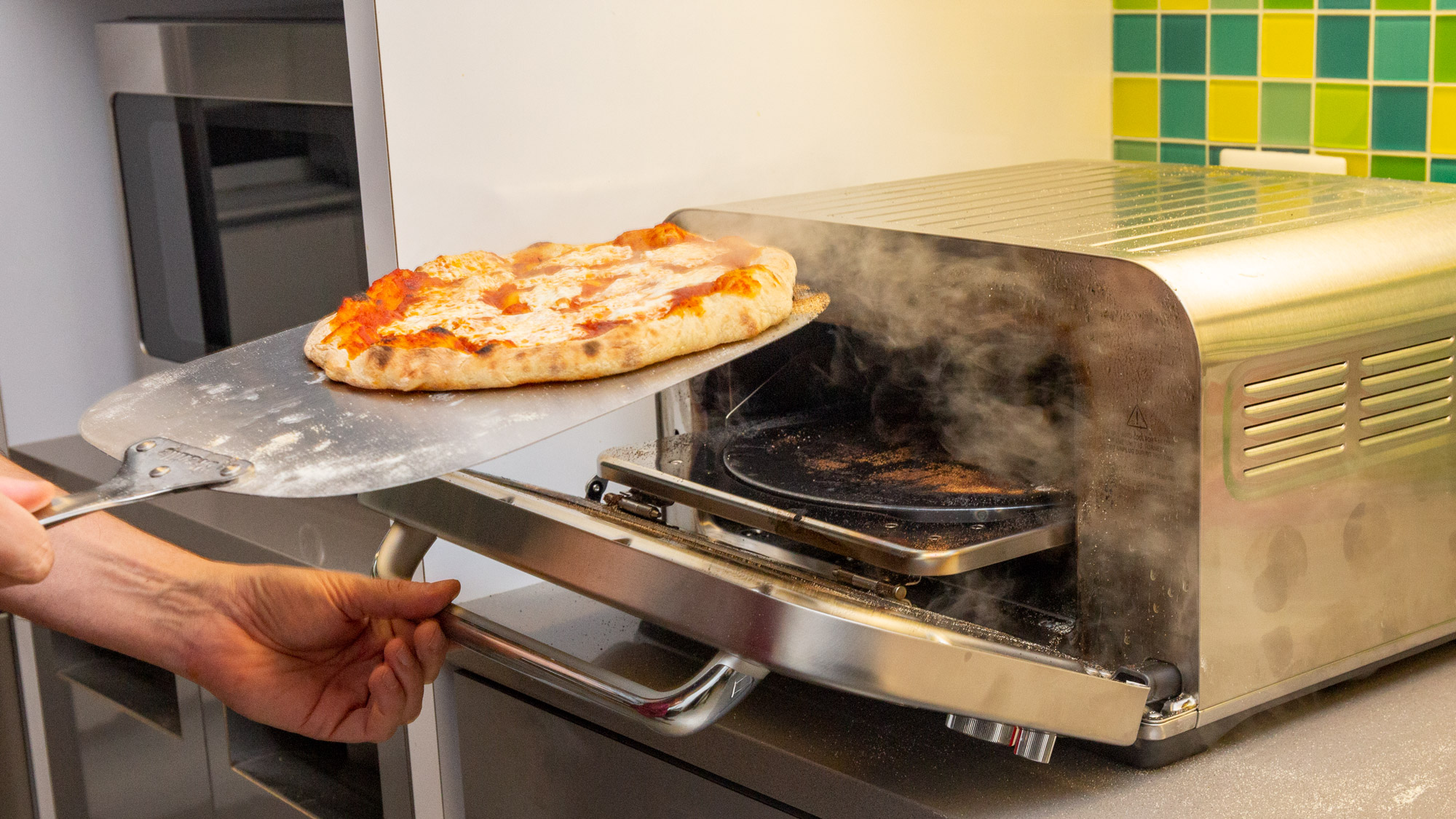
Specifications
Reasons to buy
Reasons to avoid
When the weather outside isn't the best for making pizzas, you could use your oven or something like the Breville Smart Oven Pizzaiolo, which can get nearly as hot (on the inside) as any outdoor model.
Breville's oven has been around for more than five years, so it's definitely showing its age, but when we tested it, we were impressed with how quickly it could make pizzas — nearly as fast as any of the outdoor pizza ovens we tested.
We also liked that the Breville has settings for various styles of pizza, as well as a built-in timer, which helps take the guesswork out of needing to know what temperature you need to set it at.
When it originally launched, the Pizzaiolo cost around $1,000, but you can now find it for less than $800, which makes it less expensive than the Ooni Volt, another great electric pizza oven.
Read our full Breville Smart Oven Pizzaiolo review.
Best cheap electric oven
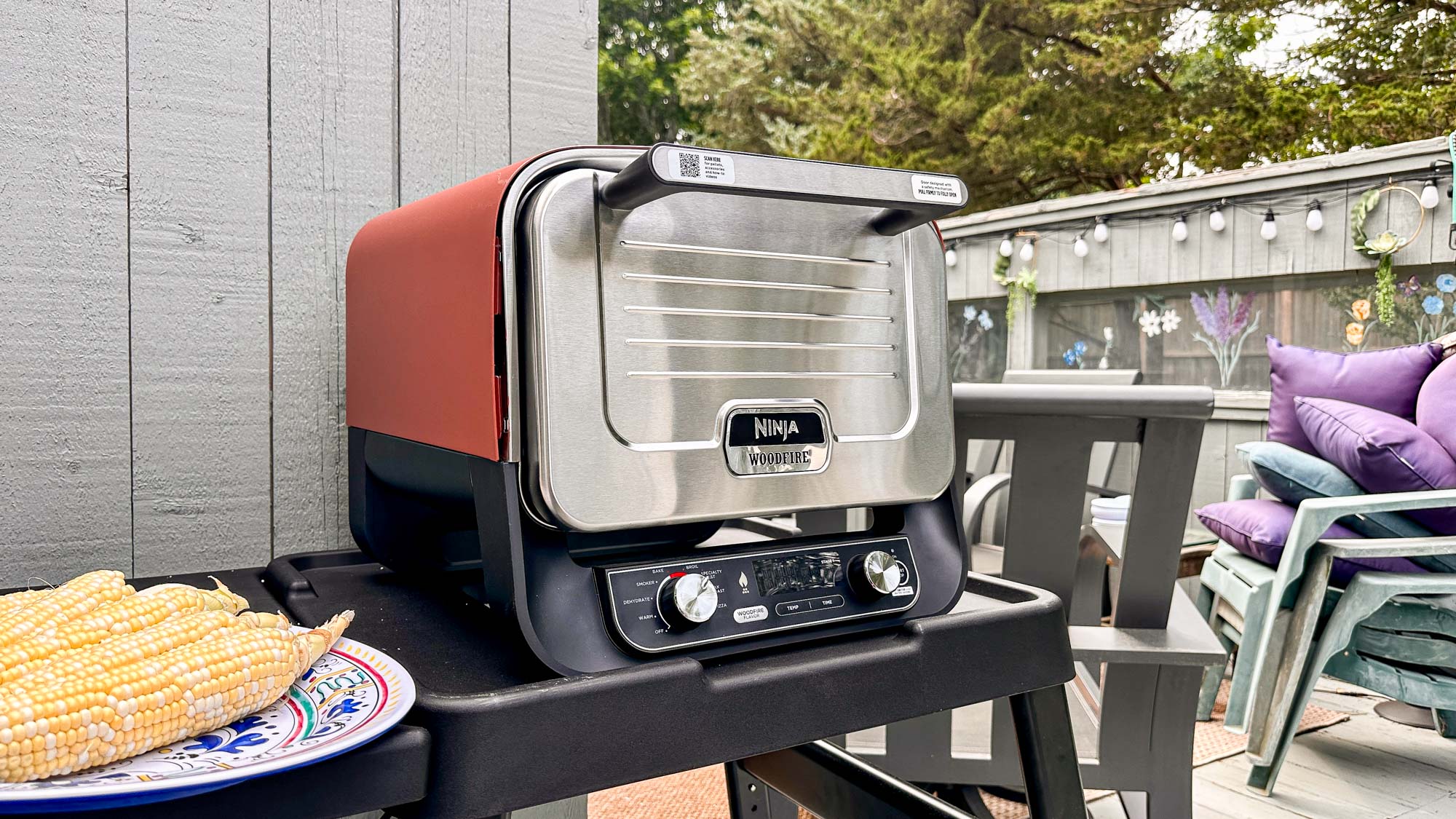
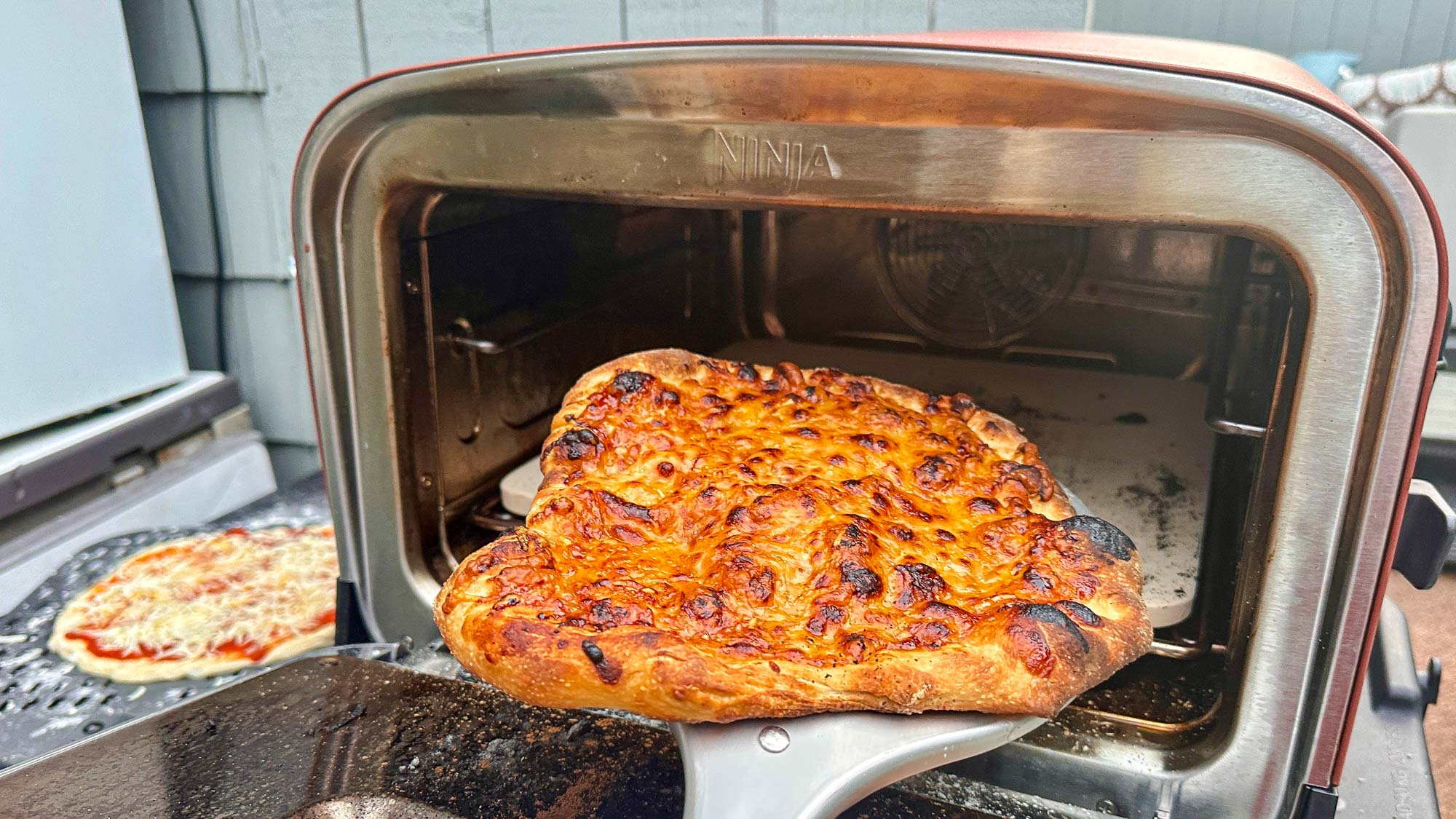
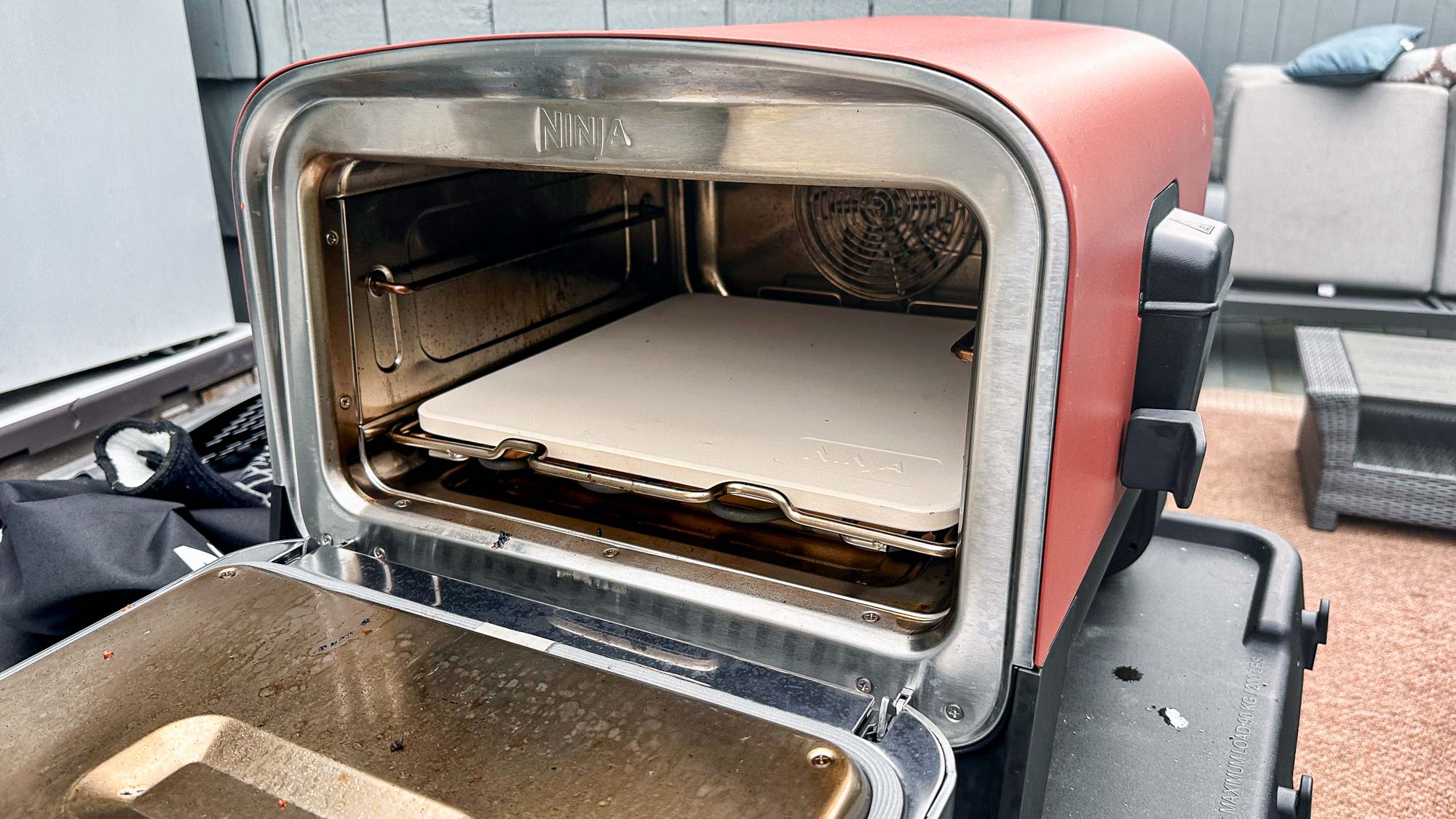
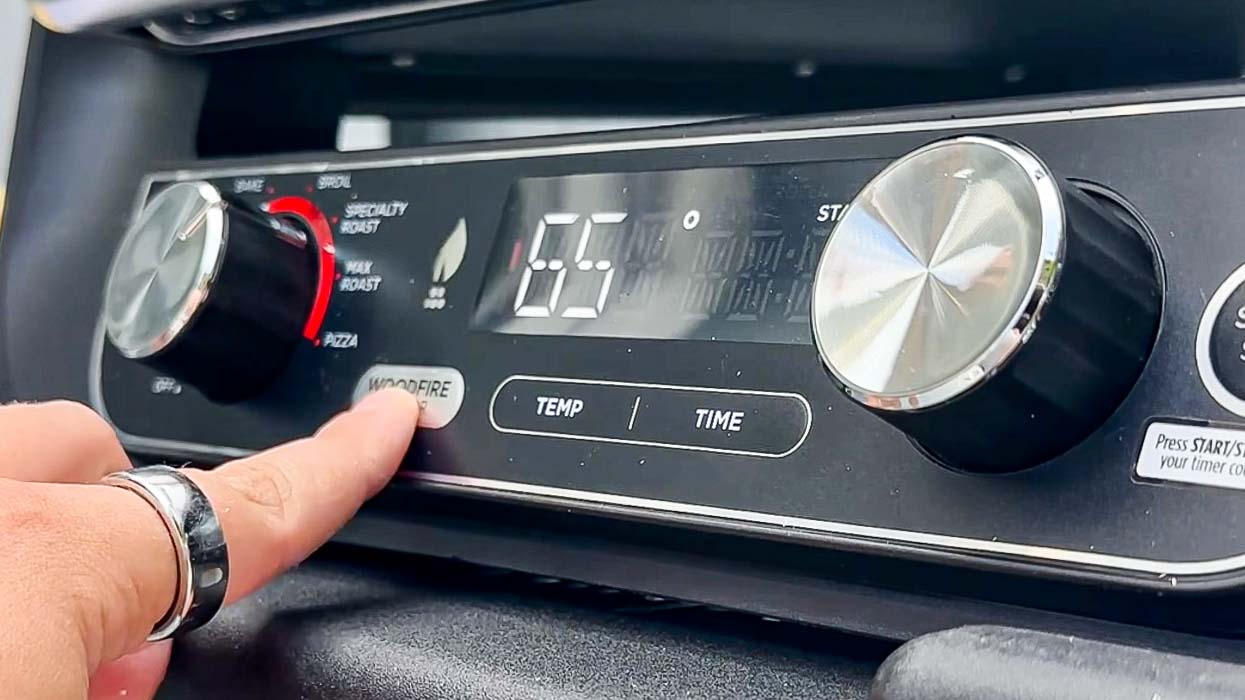
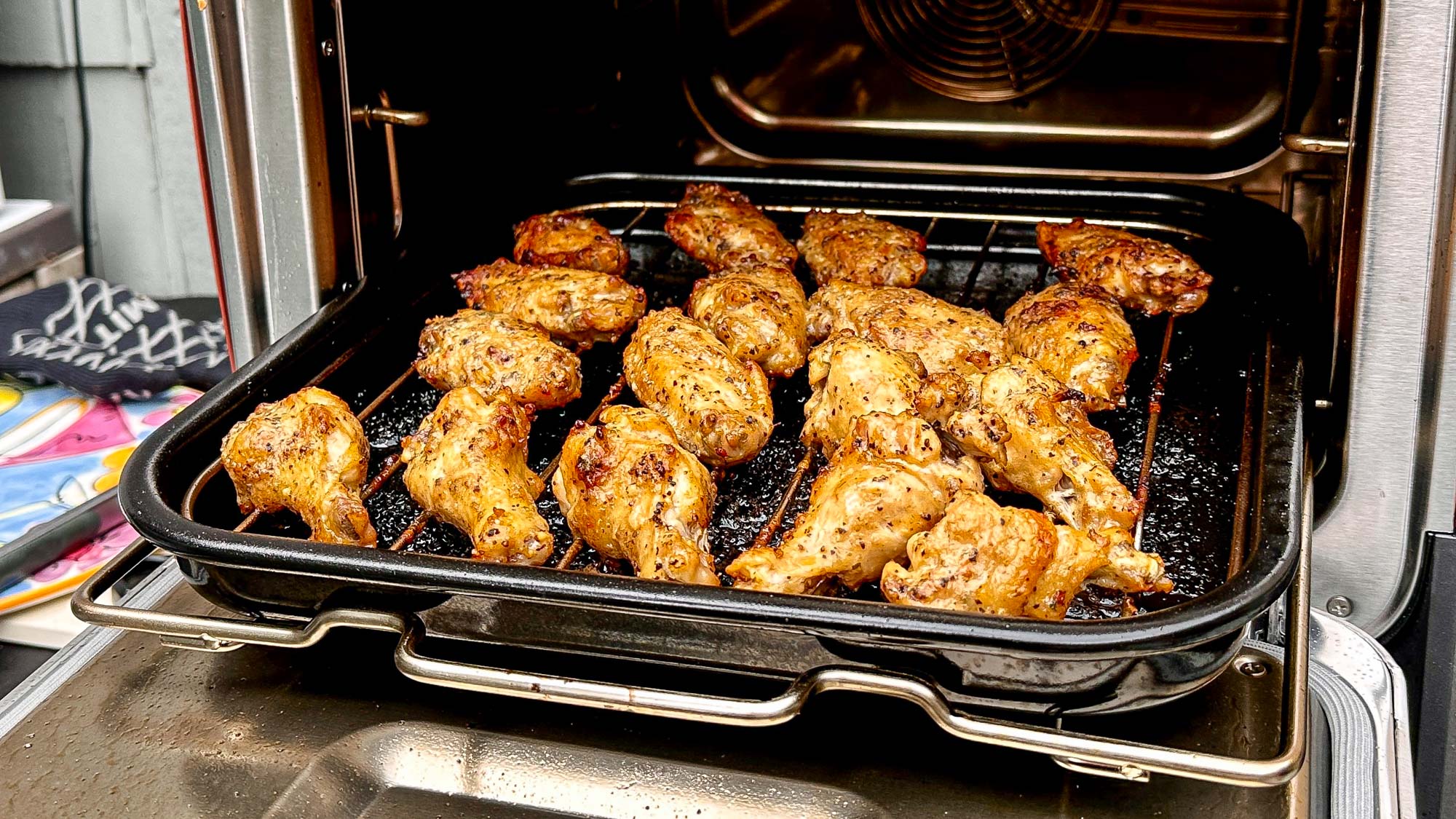
Specifications
Reasons to buy
Reasons to avoid
While the Ninja Woodfire oven doesn't get as hot as some of the other models on this list — it won't be as easy to make those Neapolitan-style pies — the Woodfire's larger interior area and electronic temperature controls does give you a lot more versatility; in addition to pizza, we were able to make corn, chicken, even dessert in the oven. It can even let you smoke foods, thanks to its smoke box for wood pellets.
Our biggest issue with the Woodfire was its size; if you want to cook for a crowd, you're going to want something bigger. But, if you're only making dinner for yourself and a few others, it should do the trick. And, it's a cinch to clean too.
If you don't mind splurging — and only want to cook pizzas — then you should also check out the Ooni Volt, an electric oven from the company that popularized pizza ovens. The Volt can reach temperatures of up to 800 degrees, but it costs $1,000 — more than twice as much as the Woodfire.
Read our full Ninja Woodfire Outdoor Oven review.
Best for large pies
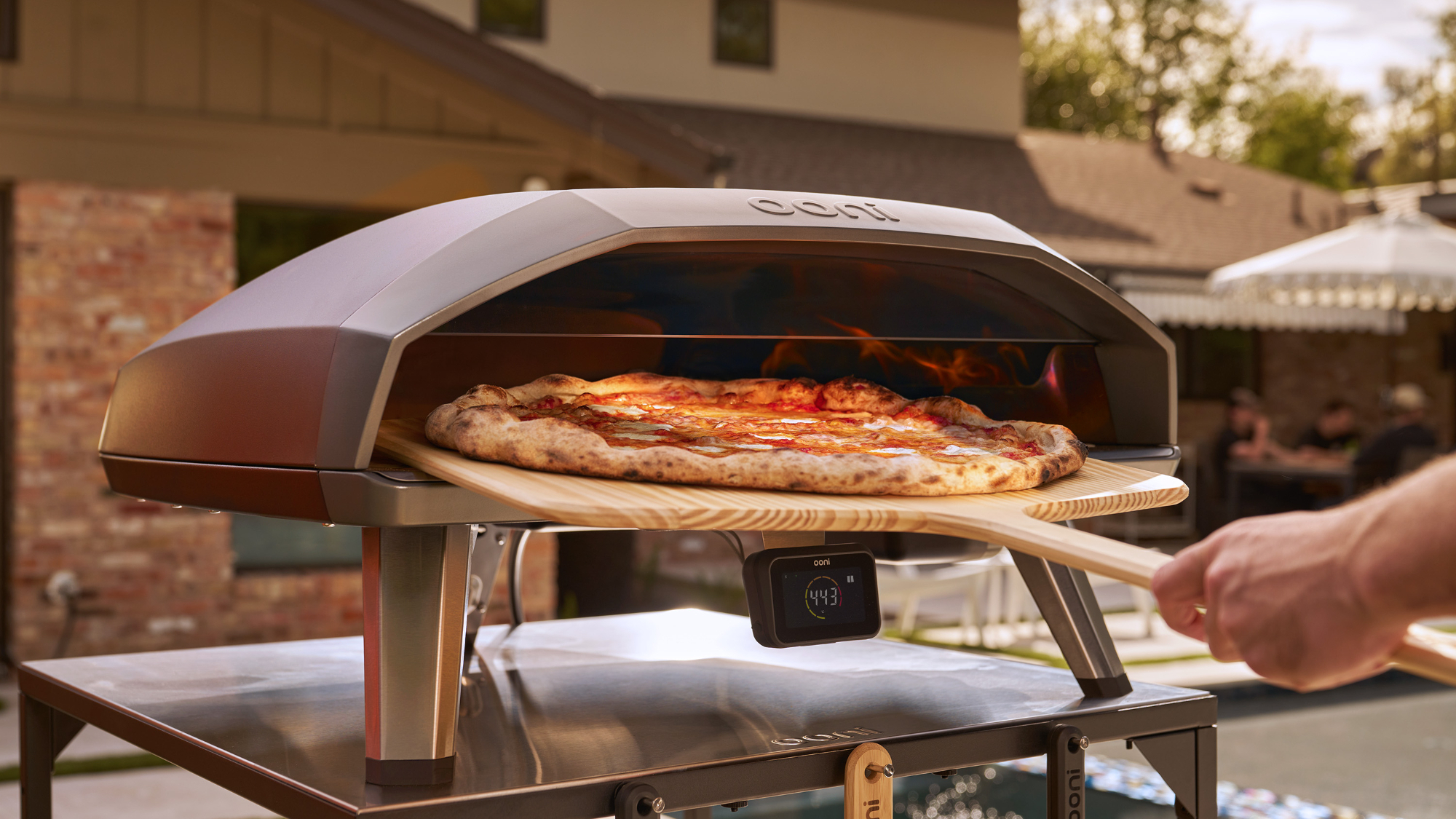
Specifications
Reasons to buy
Reasons to avoid
This is the best pizza oven for when you've got to feed a crowd. With its massive 24-inch cooking area, the Koda 2 Max can bake pies as large as you get from your local pizzeria.
But, what we liked even better about this oven is that it has two separate cooking zones, so you're not stuck making mega-size pizzas. Instead, you can cook two pizzas, or a pizza and a steak, or steak and vegetables — whatever combo you want — side by side, at different temperatures.
That's what we did in our review, making everything from meat to veggies to even stuffed shells inside the Koda 2 Max. And they all came out great.
There are a few downsides to such a large oven, though. For one, it's huge, so you're going to need a lot of space outside. And, at 95 pounds, you're going to need some help moving it around. It's certainly not as portable as the Gozney Tread. Once we set it up in our backyard, we didn't want to move it again.
Lastly, the Koda 2 Max costs $1,195, making it the most expensive of Ooni's pizza ovens. And, if you're going to make 24-inch pizzas on this thing, you're likely going to need to get a new pizza peel — yet another expense. That's a lot of dough to shell out.
Read our full Ooni Koda 2 Max review.
Also tested
Breeo Live Fire Pizza oven bundle (★★★★☆)
If you have the Breeo fire pit, this attachment will let you bake pizzas over an open flame. In our tests, it delivered excellent results, but it's a really heavy attachment — you'll need a friend to help move it — and it's much pricier than what Solo Stove offers.
Read our full Breeo Live-Fire Pizza Oven Bundle review
Gozney Arc (★★★★☆)
The Arc looks like Gozney's high-end Dome pizza oven, but comes in at less than half the price. Yet, it makes pizzas just as well. We loved its little thermometer, too. The Arc comes in two sizes: the Arc, which makes 14-inch pizzas, and the Arc XL, which can make pizzas up to 16 inches.
Read our full Gozney Arc review.
Alfa Nano (★★★★☆)
The Alfa Nano pizza oven bakes pies as good as it looks, which is to say, excellente. You can order this pizza oven to use either wood or gas, and heats up to searingly high temperatures, so we were able to cook our pies in around two minutes. The large interior space inside the oven also made it a cinch to turn them to make sure all sides were being cooked evenly. The Nano's large opening also made it easy to see what was going on inside, too.
The Nano's temperature control allowed us to precisely adjust the flame inside the oven, but the knob did get hot to the touch. Also, this is a heavy and expensive oven, so you're not going to want to move it, unlike some of the more portable options from Ooni and others. But, it's a good option if you're looking for a pizza oven that will be the centerpiece of your outdoor kitchen.
Read our full Alfa Nano review.
Gozney Roccbox (★★★★1/2)
The company's original pizza oven is now its least expensive, and even though it's several years old, is still a great option for those looking for an oven that's less than $500. It doesn't have the style of Gozney's other ovens, but who cares as long as it turns out excellent pies?
Read our full Gozney Roccbox review.
Outdoor pizza ovens compared
Here's a quick rundown of all of the pizza ovens in this guide; keep in mind that the prices of each may vary.
| Row 0 - Cell 0 | MSRP | Fuel source | Max pizza size |
Ooni Karu 16 | $799 | Wood, pellets, propane (w/adapter | 16 inches |
Ooni Fyra | $349 | wood pellets | 12 inches |
Solo Stove Pi Prime | $349 | Propane | 12 inches |
Ooni Koda 16 | $599 | Propane | 16 inches |
Gozney Roccbox | $499 | Propane | 12 inches |
Bakerstone Portable Gas oven | $319 | Propane | 14 inches |
Gozney Dome | $1,999 | Propane, natural gas, wood | 16 inches |
Alfa Nano | $1,399 | Propane, natural gas | 14 inches |
How we test the best pizza ovens
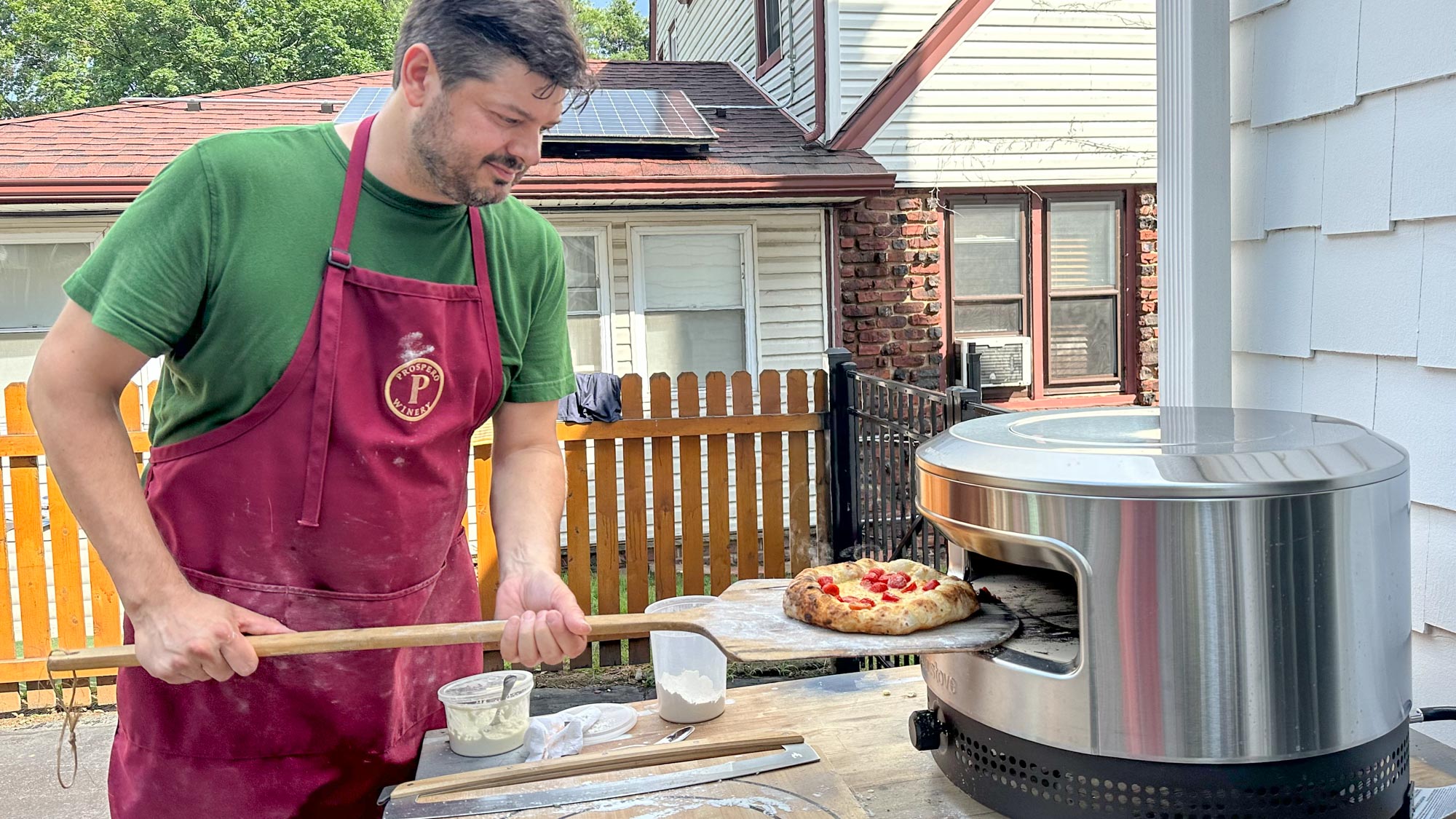
To test each oven, we followed its manual for instructions on assembly, setup, ignition, cooking, and cool-down. In order to get the most authentic experience, we also only used the peels, tools, etc. that came with that particular oven. We also wanted to see how each oven would perform with a variety of types of dough.
For each oven, we made several pies, using at least one of each of the following pizza doughs: homemade, store-bought refrigerated (Trader Joe’s), store-bought frozen (Wegman’s), and dough purchased from a local pizzeria that specializes in thin-crust pies.
But to also keep things simple (and fair), we tested each oven with Margherita pizzas topped only with tomato sauce and hand-torn mozzarella, with a little basil and olive oil drizzled on after cooking. Of course, we made lots more pies in each oven, because hey, pizza, right?
On some ovens that could accommodate cast-iron pans and skillets, we also tried searing steaks and roasting vegetables and fish, to see how other types of food fared under the flames.
In addition to its cooking performance, we also evaluated each oven on its ease of setup, how hot the oven got (both on the inside and outside), and how easy it was to control the temperature. For wood or wood pellet models, we also looked at the ease with which we could add fuel.
What to look for in a pizza oven
Fuel source
Outside of price, the biggest factor to consider when buying a pizza oven is the fuel source. Ovens can be heated by either propane, charcoal, or wood pellets (there are also electric options for indoor models). Before choosing an outdoor pizza oven, decide which heat source is right for you. In our tests, the propane ovens were easier to control, but pizza ovens that used either wood, wood pellets, or charcoal gave the pies a smoky flavor reminiscent of good grills. Plus, it's easier to carry a bag of charcoal or wood pellets than it is a tank of propane, especially if you're planning to bring your pizza oven to a camping trip or tailgate.
The ovens’ ceramic pizza stones, when heated, can hold very high temperatures, giving your pie a nice char on the bottom. The main differentiator in our tests was the heat source and how it affected the cooking on top of the pie; without a high temperature, you won’t get the dotted char known in the industry as “leoparding” (because it looks like a leopard, get it?). We found that the gas ovens with an exposed flame — the Ooni Koda 16 and the Gozney Roccbox — were best for getting a nice char.
Oven size
You’ll also want to think about the size of the oven itself. The majority of outdoor pizza ovens can make pies that are about 12 inches in diameter, but some can make larger, 16-inch pizzas, which may be the better option if you’re looking to feed a crowd. Some have a taller interior, which makes them better suited for baking other types of food, such as bread.
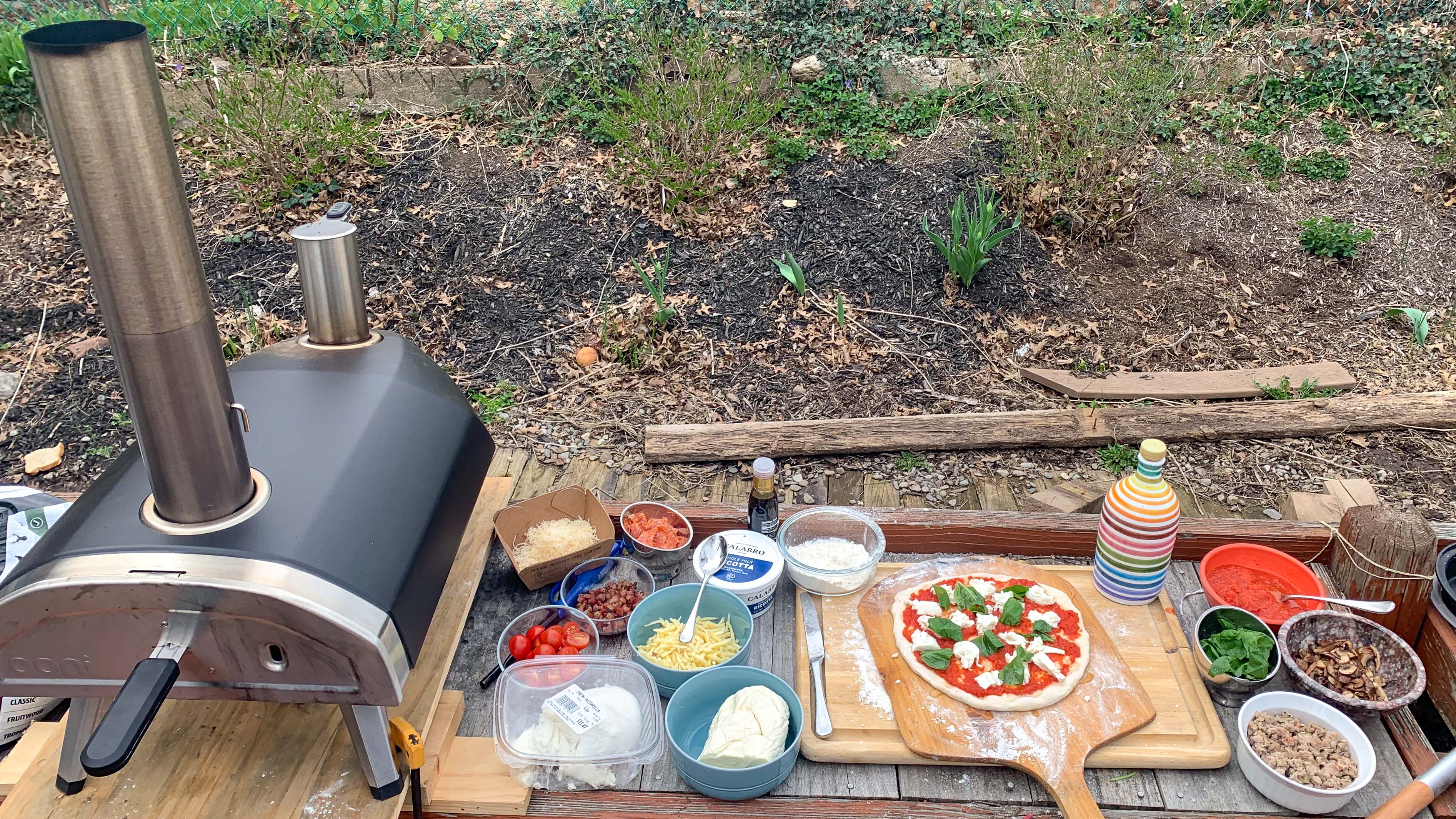
Lastly, one thing to consider before you buy an outdoor pizza oven is whether you have the proper space for it. These ovens should be set up at a standalone table at least a couple of feet away from any other structure, and most recommend not setting them up underneath another enclosure (an upstairs deck, for instance). Make sure you follow our steps on how to use a pizza oven safely.
Pro tips for pizza making
Every oven is slightly different; we highly recommend thoroughly reading through the setup manual to ensure proper safety precautions and usage. Every propane-fueled oven we tested recommended doing a soapy water test to make sure there were no leaks, and a few stressed the importance of running the oven for up to 30 minutes on its first use to burn off any impurities. Give yourself time to get acquainted with the oven — and keep in mind that chances are you won’t be a master pizzaiolo immediately. With pizza, as with many things in life, practice makes perfect.
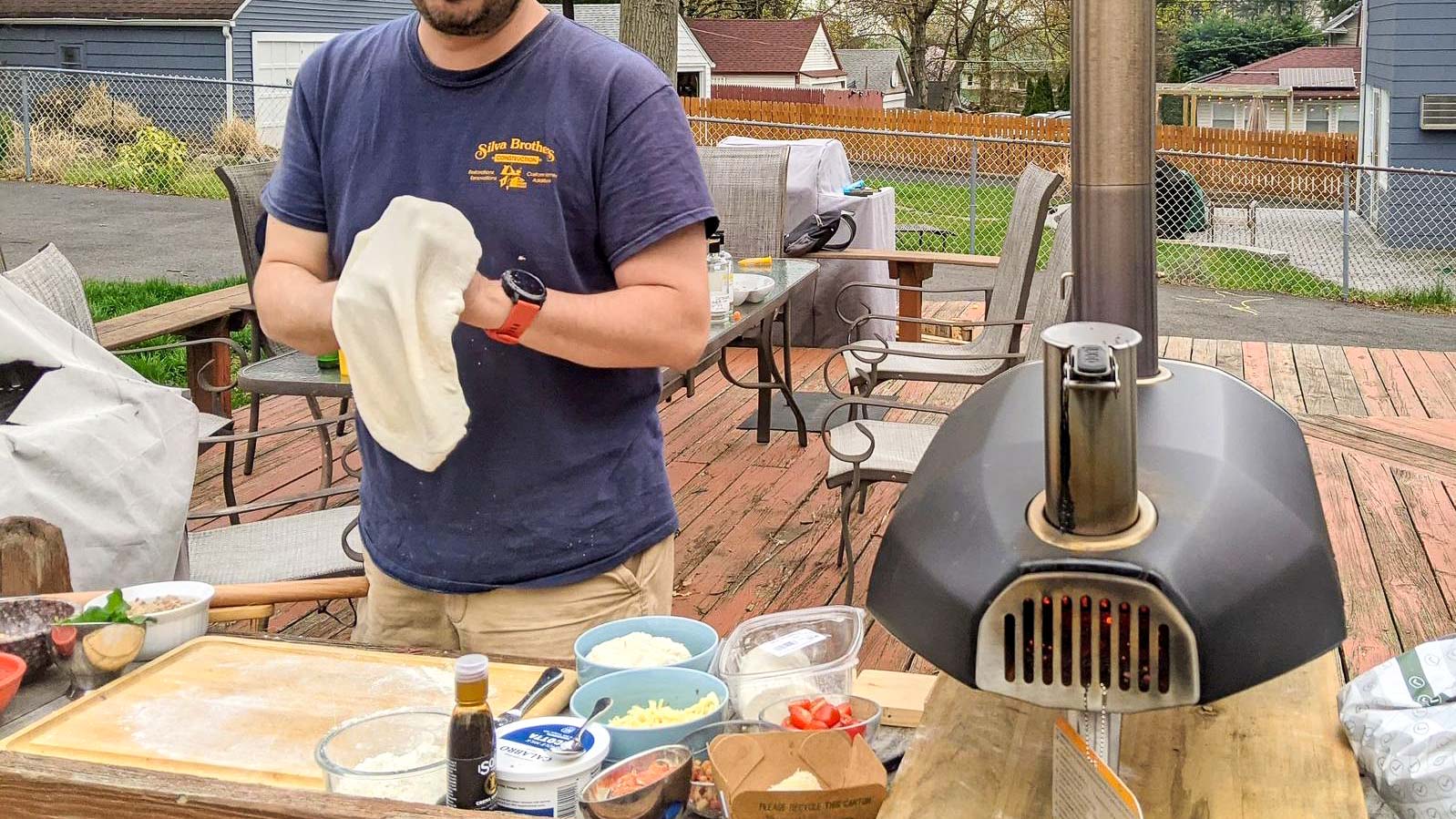
Each time you use the pizza oven, you’ll want to start it at least 15 minutes before throwing a pie into the oven; you need to give the pizza stone at the bottom of the oven time to heat up, so you get that nice char on the bottom. And, you’ll want to let it “recharge” between each pizza, too.
Another note on becoming a pizzaiolo. Even if you’re not an expert at making pizza dough — we certainly weren’t! — you’re better off trying your hand at making homemade dough or buying dough from a local pizzeria that specializes in thin-crust pies than buying store-bought refrigerated or frozen dough. In our tests, both store-bought doughs we tested (Trader Joe’s for refrigerated, Wegman’s for frozen) were difficult to roll out to a desired thinness, and had a tendency to burn on the outside while not getting fully cooked inside. If you do use store-bought dough in one of these ovens, a good rule of thumb is to use a floured rolling pin to try to get it as thin as possible before cooking. (But really, avoid it if you can.)
One pizza-making book we like is Mastering Pizza by Marc Vetri ($17.59, Amazon). It has recipes for a number of different style pies, from Neapolitan to focaccia and more, and they're all very easy to follow.
If you're a fan of take out instead, check out how to reheat pizza properly.
Other tools you'll need to make pizza
Pizza Peel
New Star Foodservice Restaurant-Grade Wooden Pizza Peel: $28 @ Amazon
This wooden pizza peel is 14 inches wide, 16 inches long with a 10-inch handle, but the company makes models with longer handles and wider surfaces. Make sure you get one that will fit inside your oven.
A pizza peel are those long, flat wooden shovels you see that are designed to glide the pizza in and out of the oven (others are sold separately). Don’t try to make pizza without one. We’d recommend sticking with the peel that comes with your oven, as they’re sized correctly for the cooking area.
If you want to get more gear, then you can also pick up a "turning" peel. These are smaller than a traditional peel, and are usually made of a flat, circular piece of metal. Typically, they're a smaller diameter than the pizza itself, so that you can easily rotate the pizza while it's still in the oven. It takes some practice to use it properly.
Whether you’re working with a stainless steel or wooden peel, we found that flouring the surface (semolina flour works best, especially for hotter ovens) and building the pizza right on the peel, then sliding it into the oven, led to the best results. You’ll also have to use a peel to pull out your pizza and turn it while it’s cooking, because you want a nice, even char. So get comfortable with your peel — it’s your pizza’s BFF!
Infrared Thermometer
Ooni Digital Infrared Thermometer: $50 @ Amazon
This digital thermometer has a full-color LCD display to show color-coded temperatures and is accurate to within 3 degrees between -22 to 932 degrees Fahrenheit
Another thing that might be worth investing in is an infrared or laser thermometer to measure the temperature of your stone (Ooni makes a good one); you’ll want one that can measure temperatures up to 1,000 degrees F if you plan on making Neapolitan-style pies.
Pizza Cutter
Gozney Pizza Cutter: $45 @ Amazon
The Gozney pizza cutter is made from carbon steel, has two sharpened edges, and the 3.2-inch cutter is removable, to make it easier to clean. It's also hefty, at 1.12 pounds, giving it a nice solid feel in your hands.
You’ll also want a few wooden peels or boards for cutting/serving, and a good pizza cutter. Many of these companies sell quality accessories that will make living your best #pizzalife that much easier. I've used a number of pizza cutters, and none has felt more solid than this model from Gozney.
Kitchen scale
OXO Good Grips 11-Pound Stainless Steel Food Scale with Pull-Out Display: $55 @ Amazon
This sturdy scale has a bright display that can pull out from the main body, helpful for when you're weighing a large bowl. It can weigh in ounces, pounds, grams or kilograms, and has a tare function. It measures 9 x 7 x 1 inches.
If you're planning to make your own dough, you'll need a kitchen scale to properly weigh out the ingredients. Measuring cups aren't as accurate, which could throw off the proportions.
Mixer
Yes, you can knead dough by hand, but one of the best stand mixers makes the job go a lot easier. If you plan on making large batches of dough, just be sure to get a mixer whose motor is powerful enough to stand up to all that mixing.
Other gear for outdoor entertaining
There's nothing like an outdoor pizza party, but you need to have more than just 'za. Check out our other outdoor buying guides for other gear to liven up your backyard.
- Best grills
- Best coolers
- Best patio heaters
- Best inflatable hot tubs
- Best solar lights
- Best Bluetooth speakers
Get instant access to breaking news, the hottest reviews, great deals and helpful tips.

Michael A. Prospero is the U.S. Editor-in-Chief for Tom’s Guide. He oversees all evergreen content and oversees the Homes, Smart Home, and Fitness/Wearables categories for the site. In his spare time, he also tests out the latest drones, electric scooters, and smart home gadgets, such as video doorbells. Before his tenure at Tom's Guide, he was the Reviews Editor for Laptop Magazine, a reporter at Fast Company, the Times of Trenton, and, many eons back, an intern at George magazine. He received his undergraduate degree from Boston College, where he worked on the campus newspaper The Heights, and then attended the Columbia University school of Journalism. When he’s not testing out the latest running watch, electric scooter, or skiing or training for a marathon, he’s probably using the latest sous vide machine, smoker, or pizza oven, to the delight — or chagrin — of his family.

